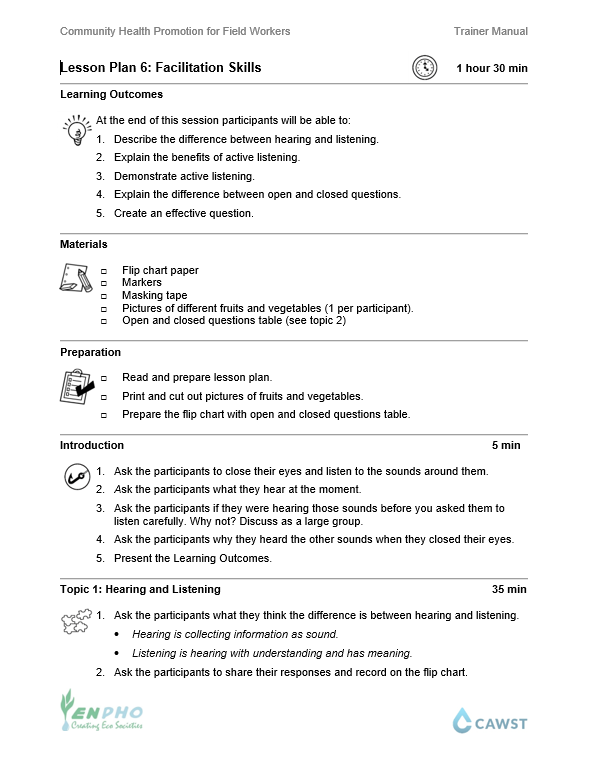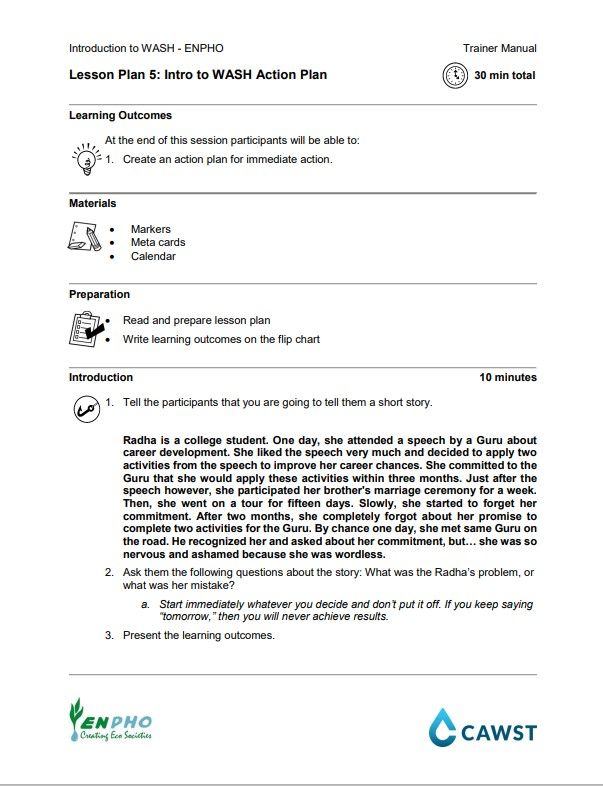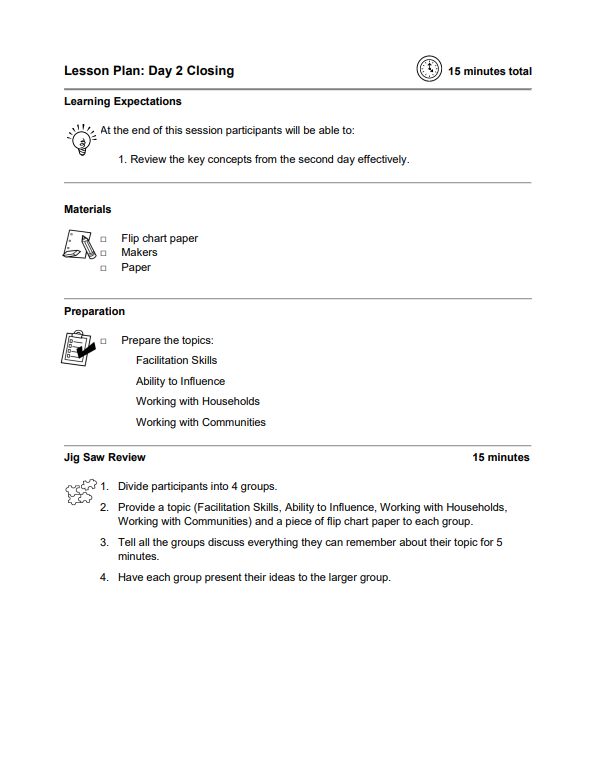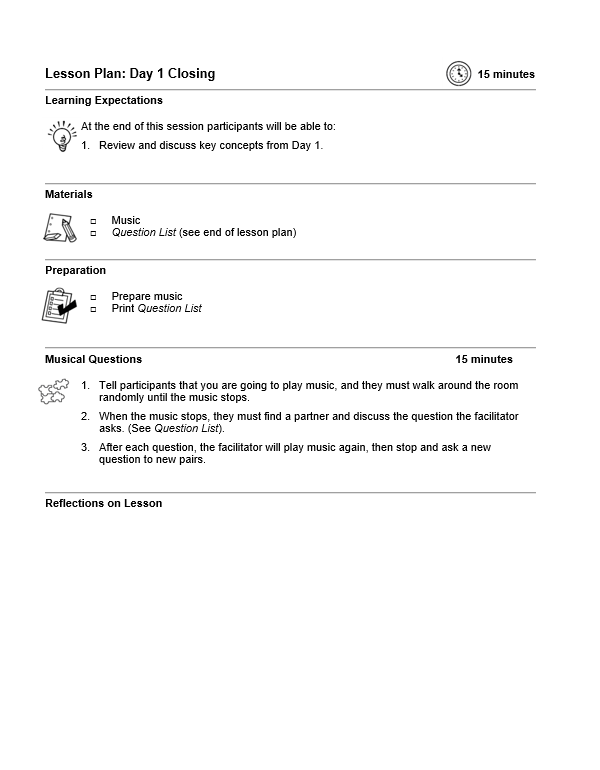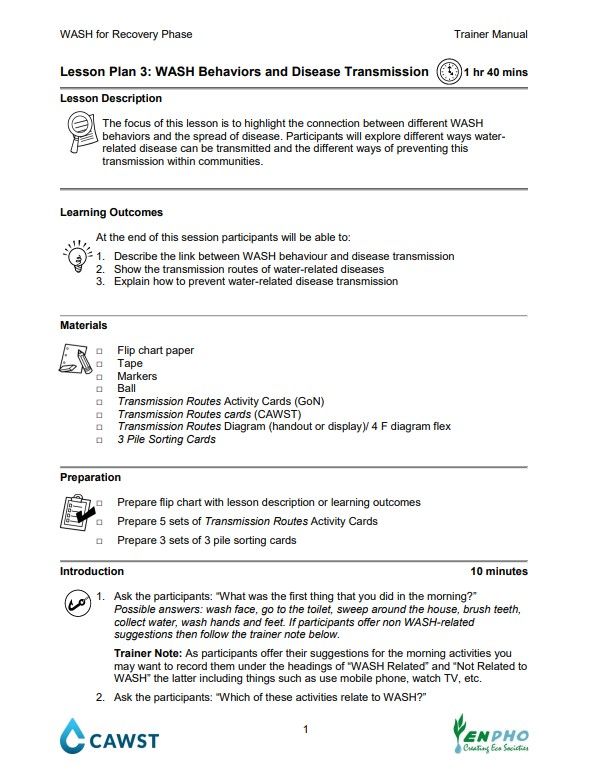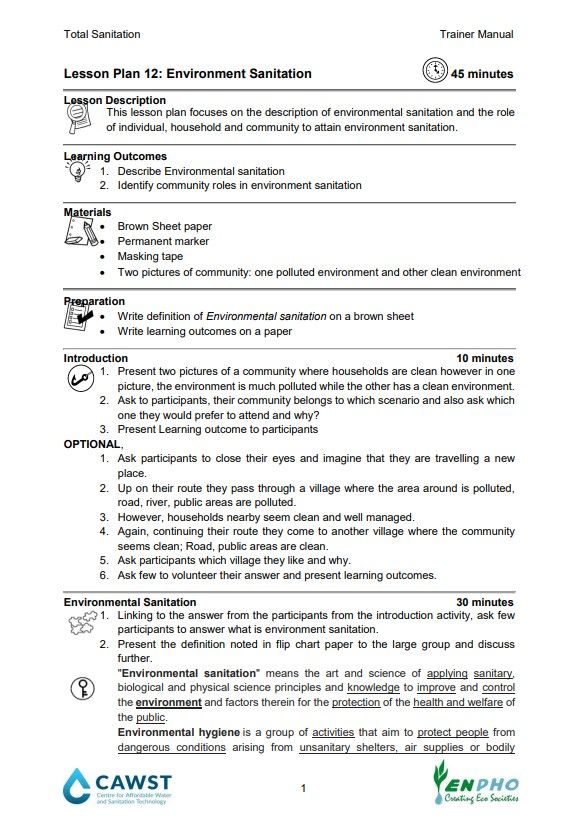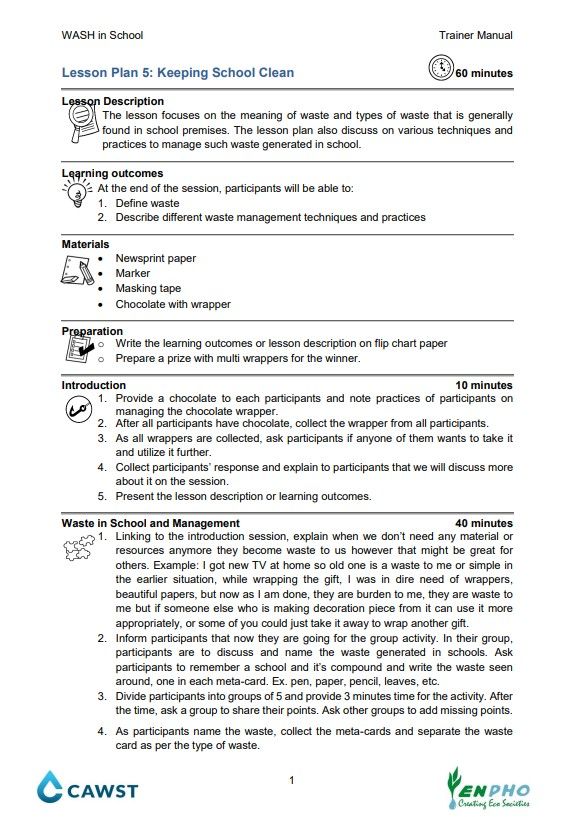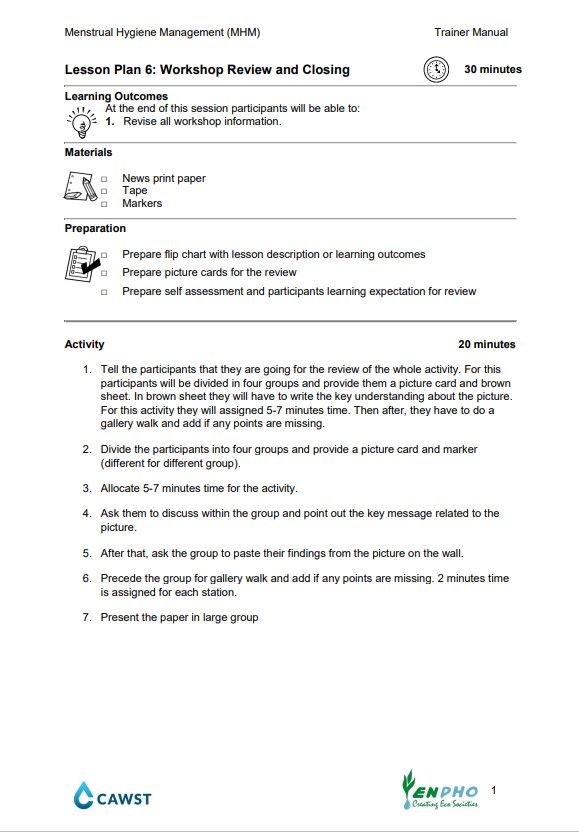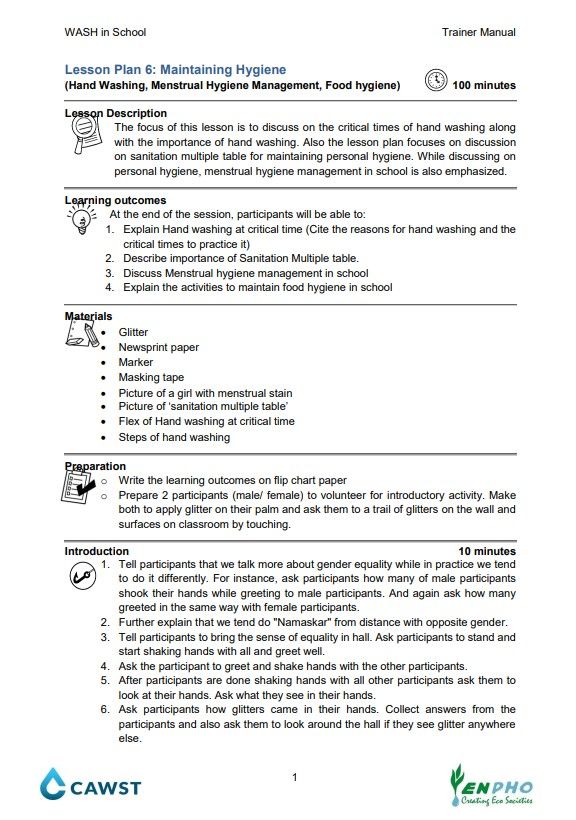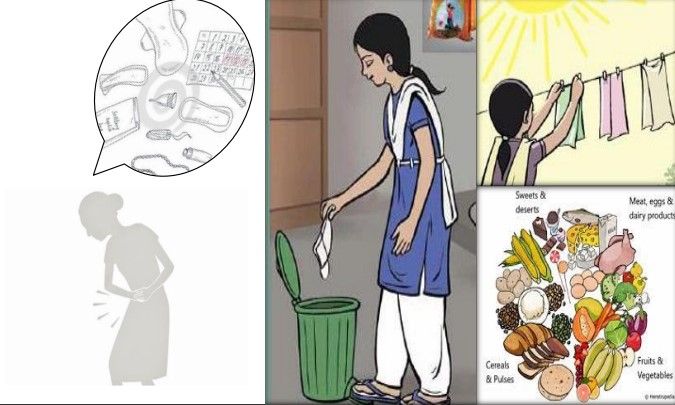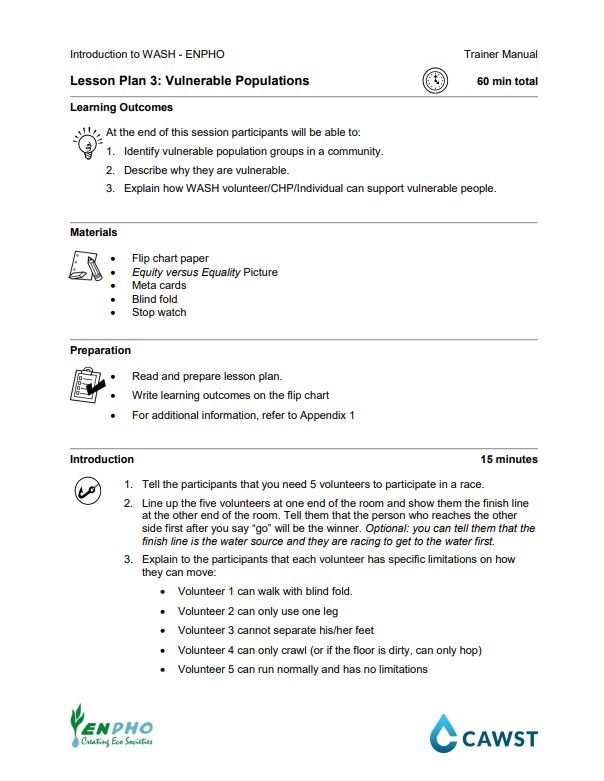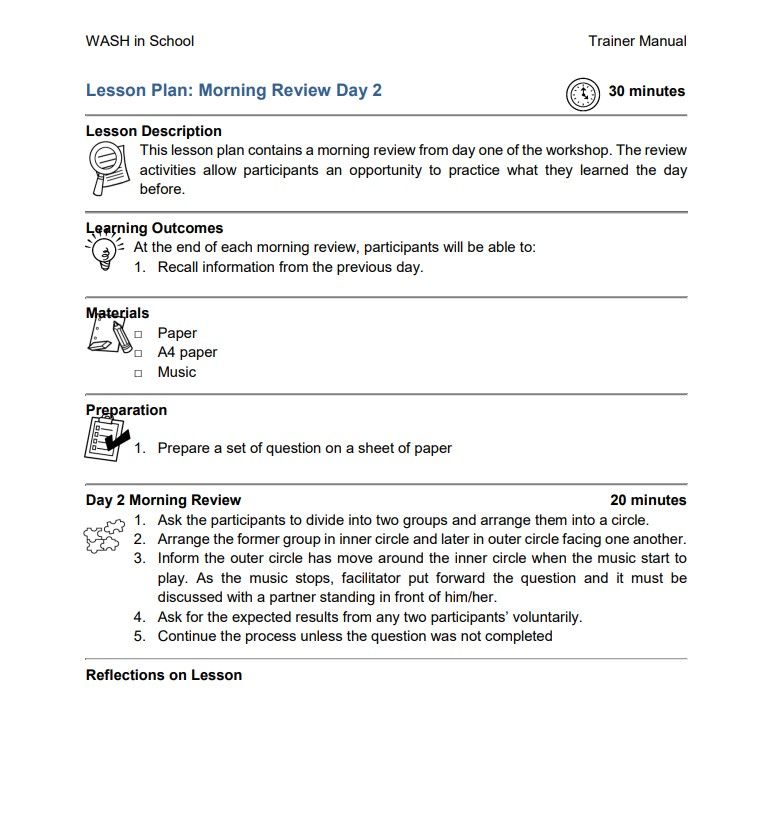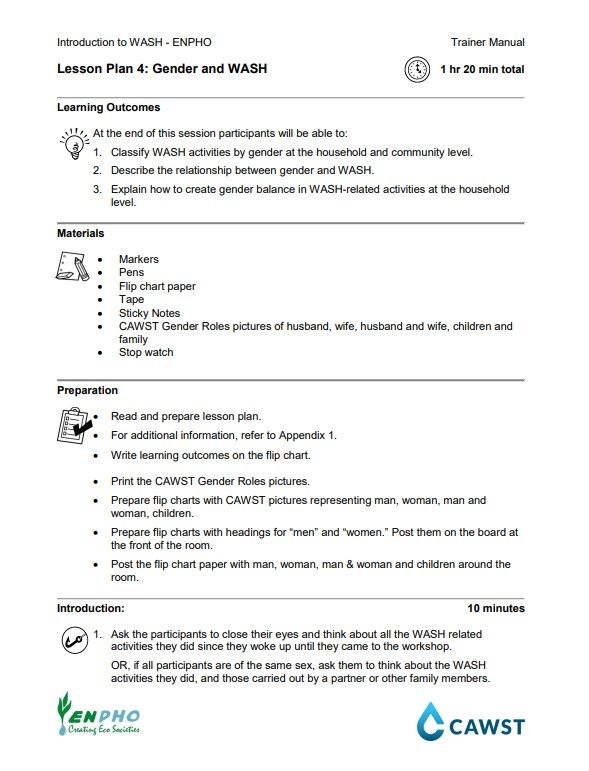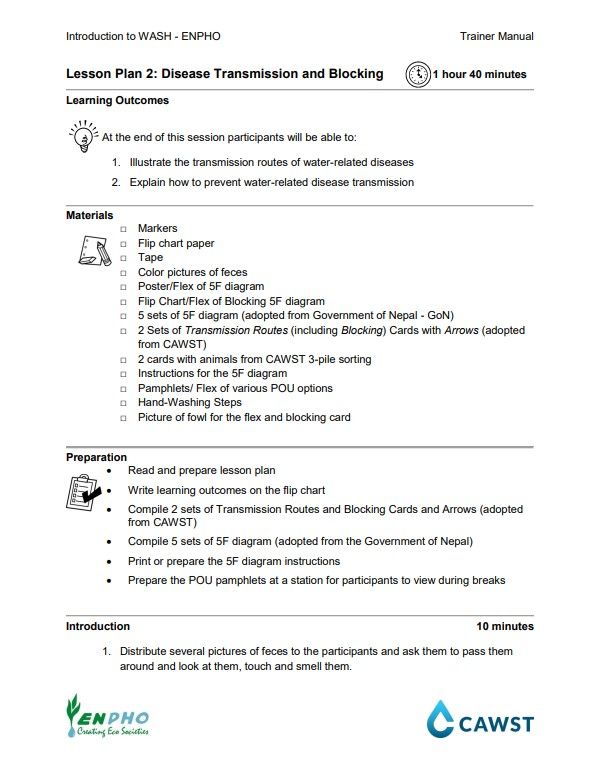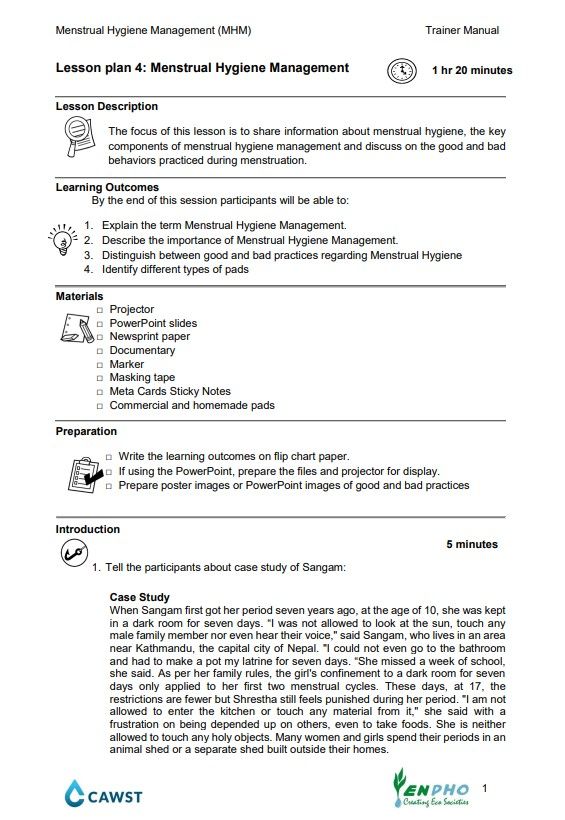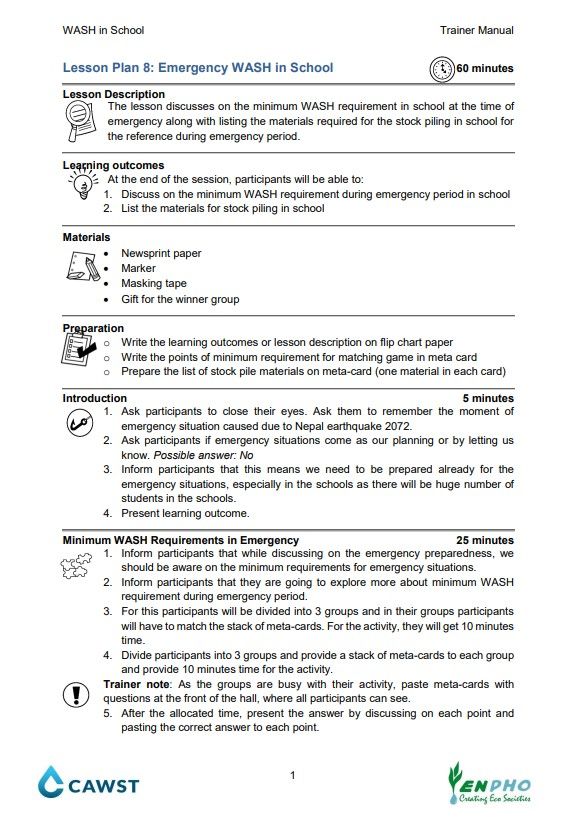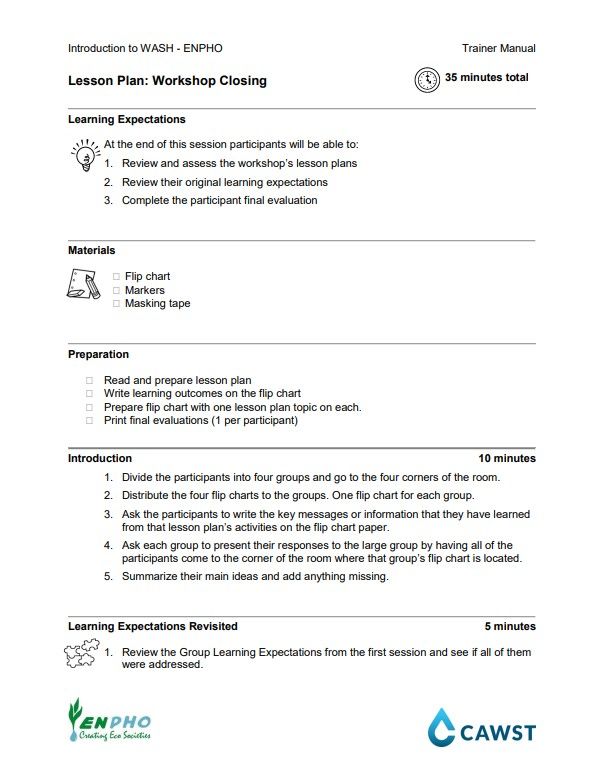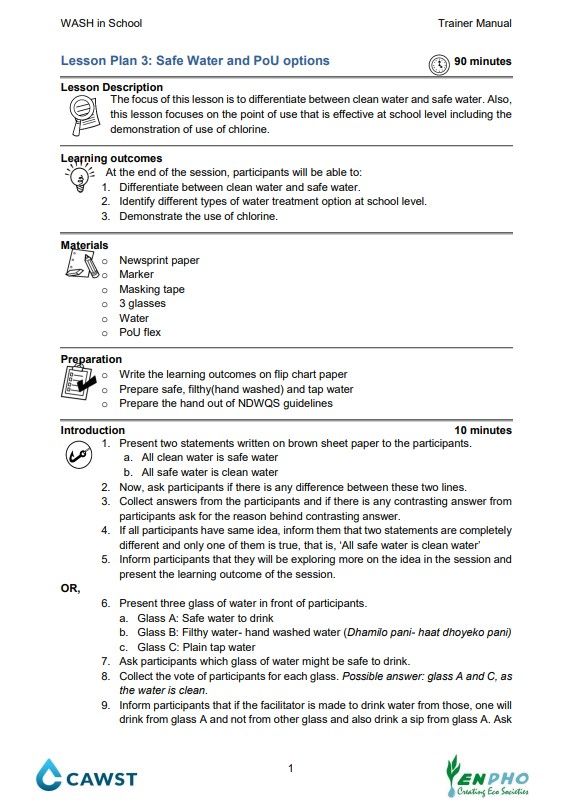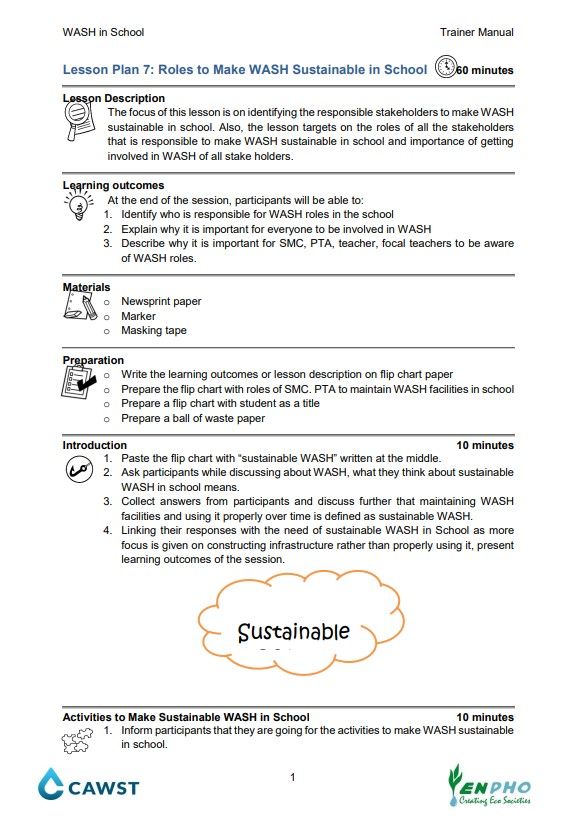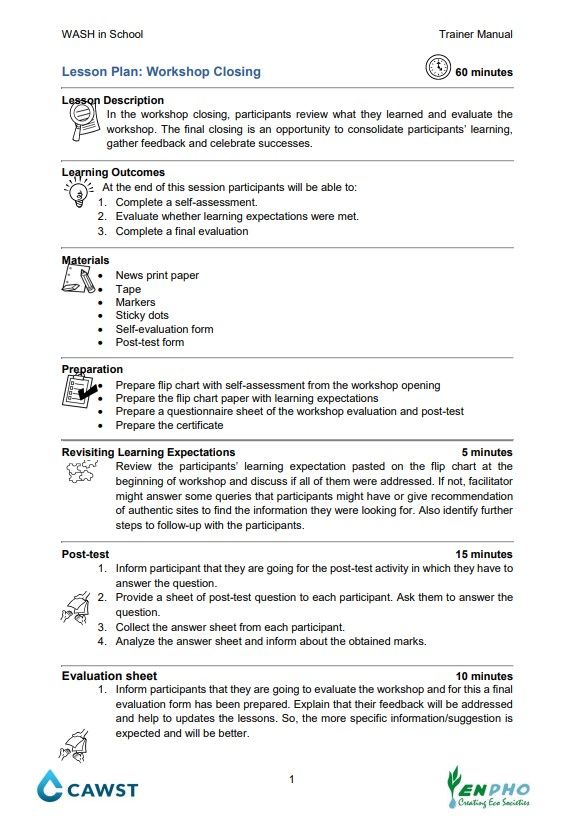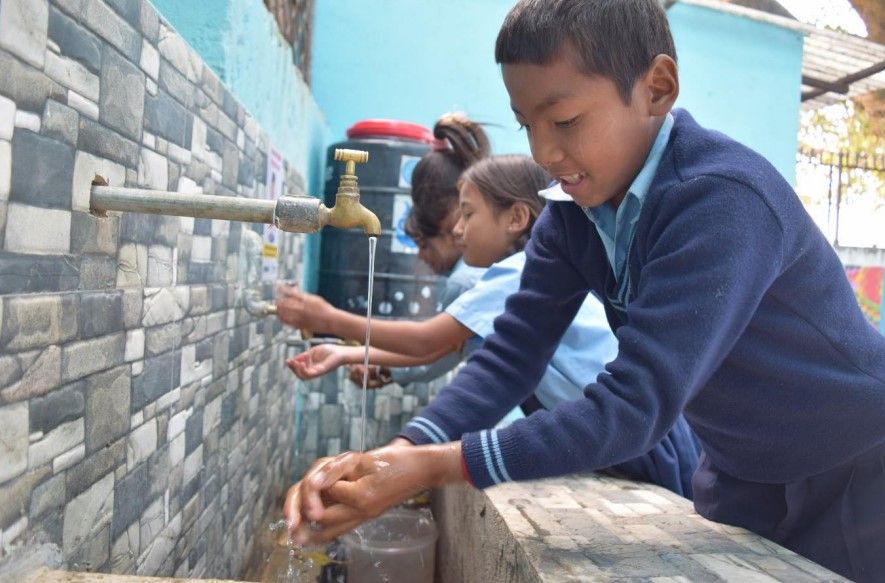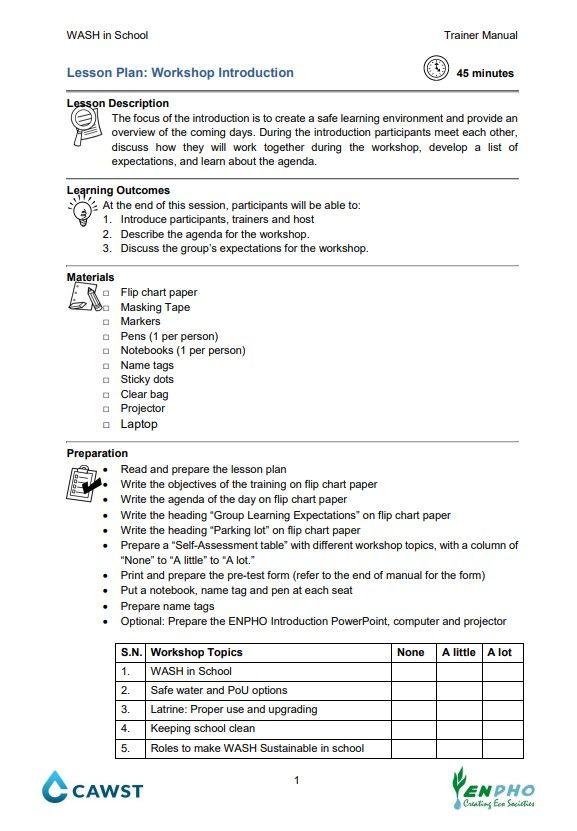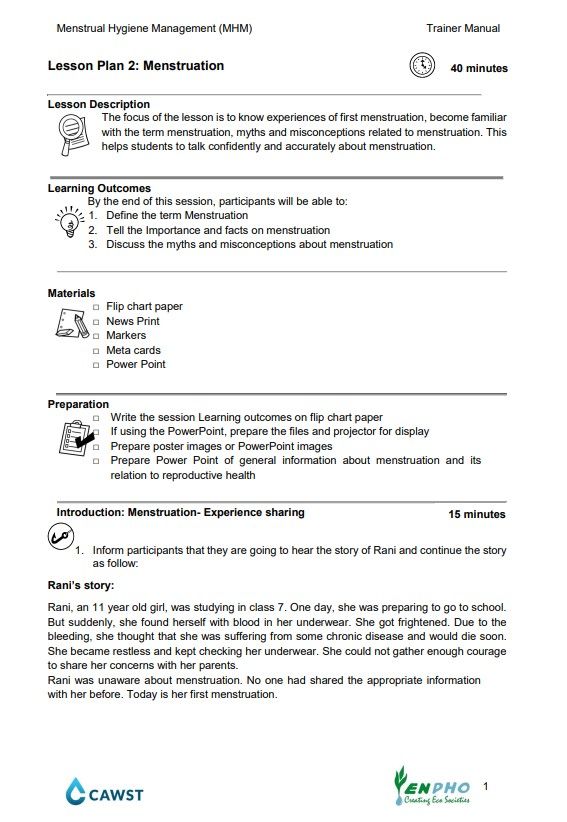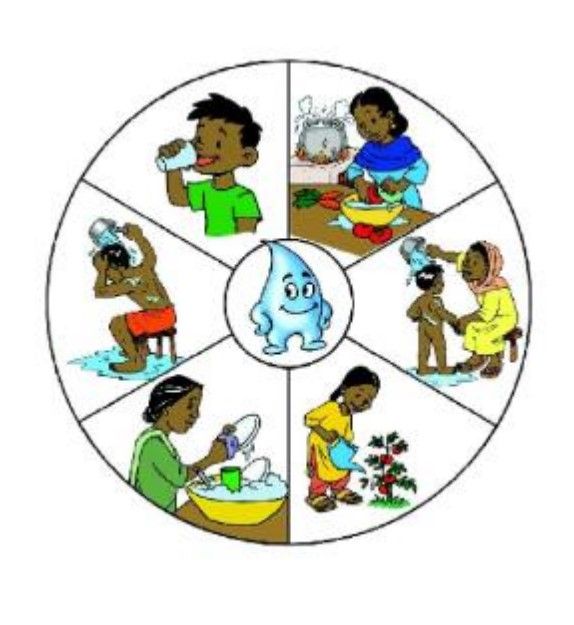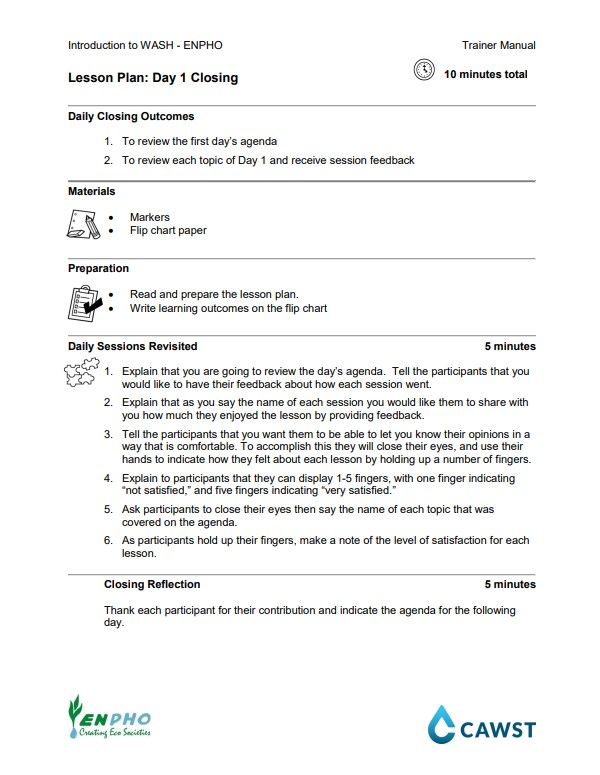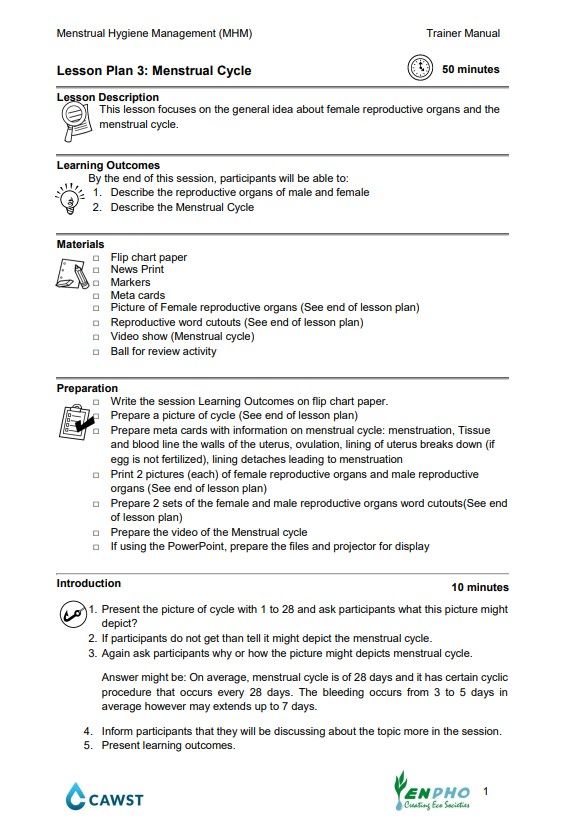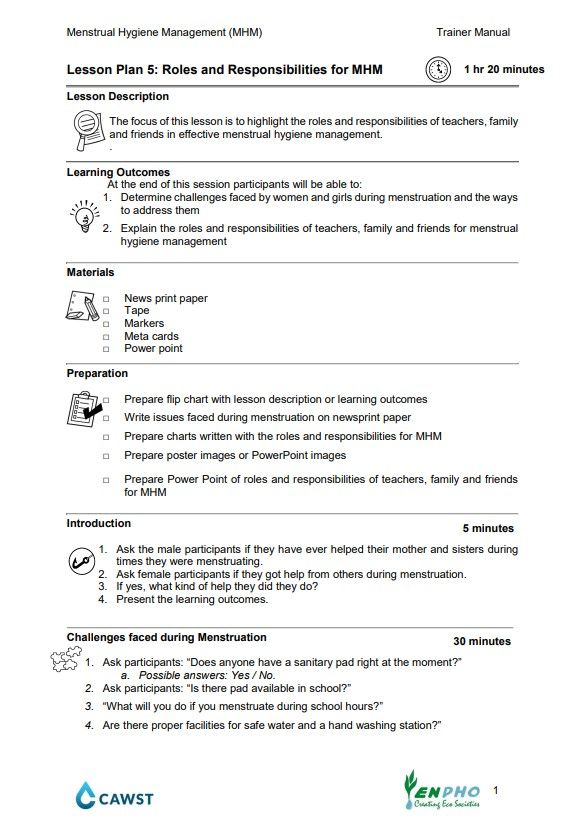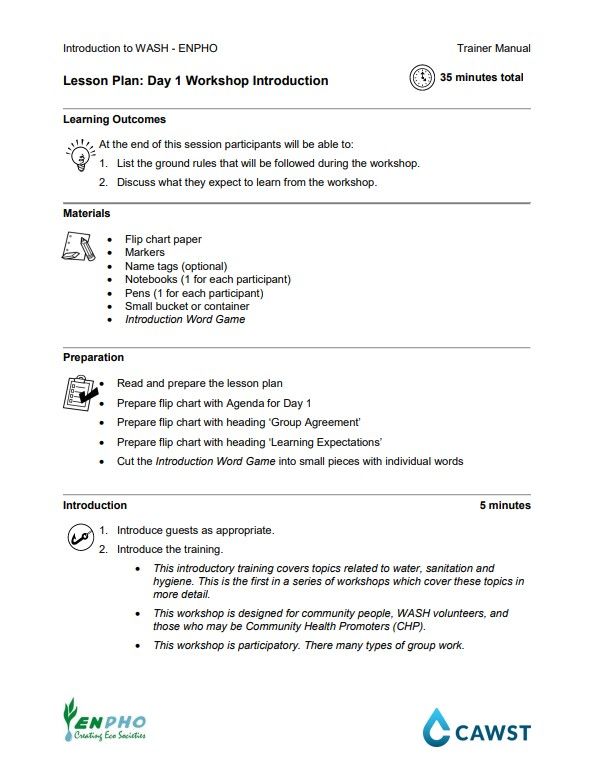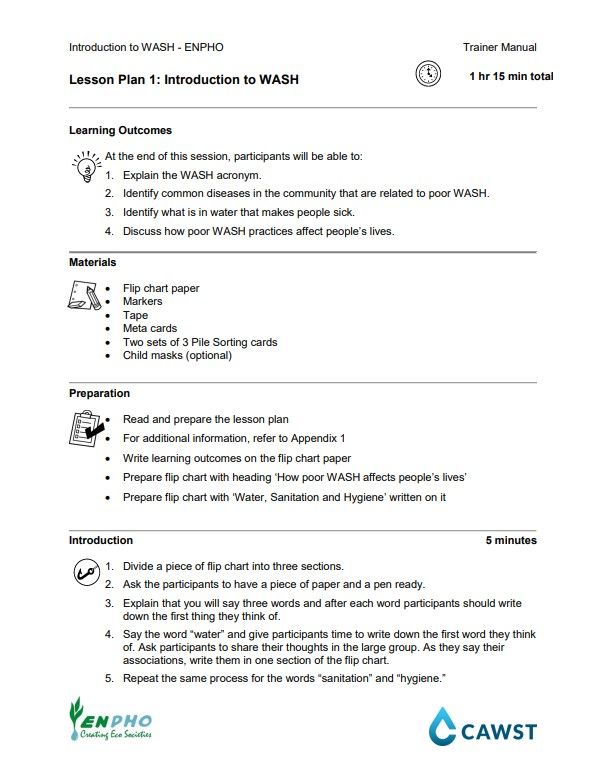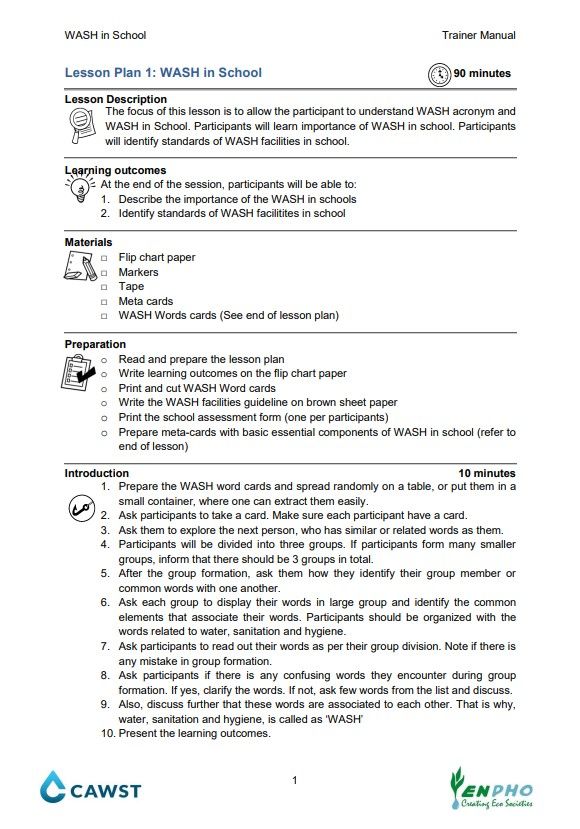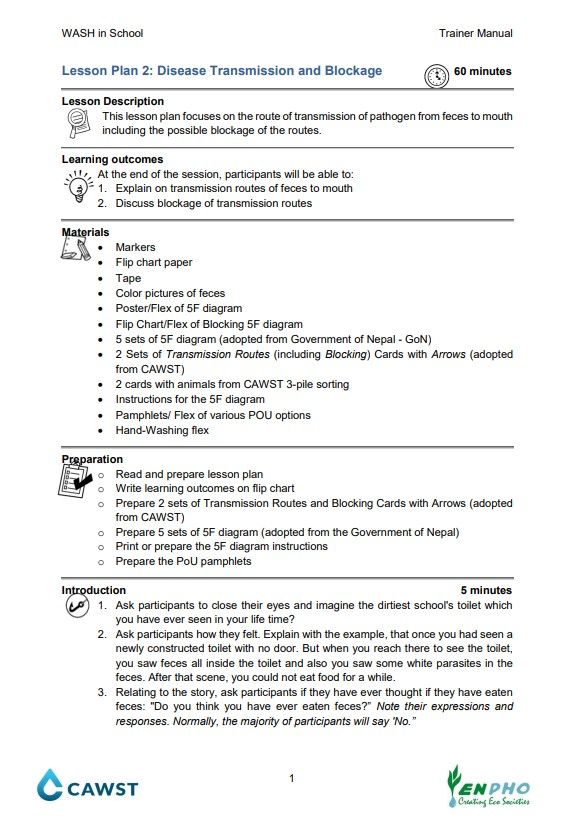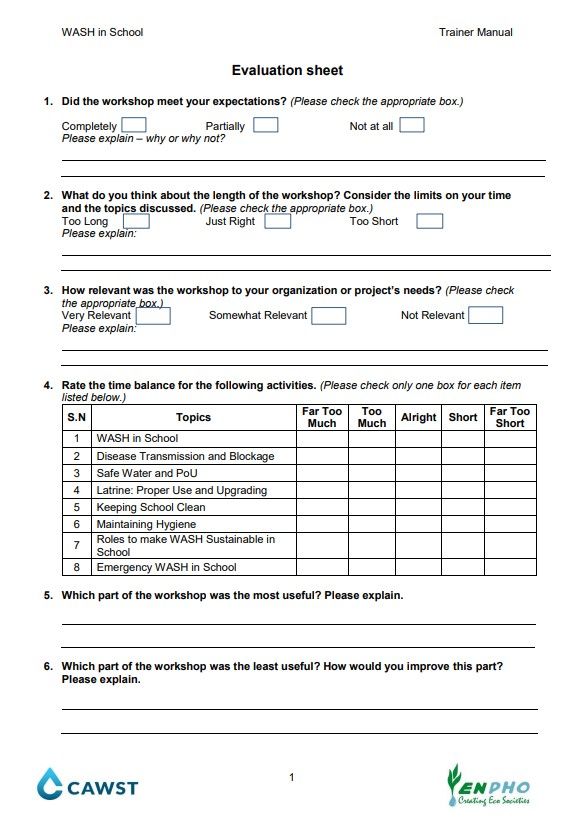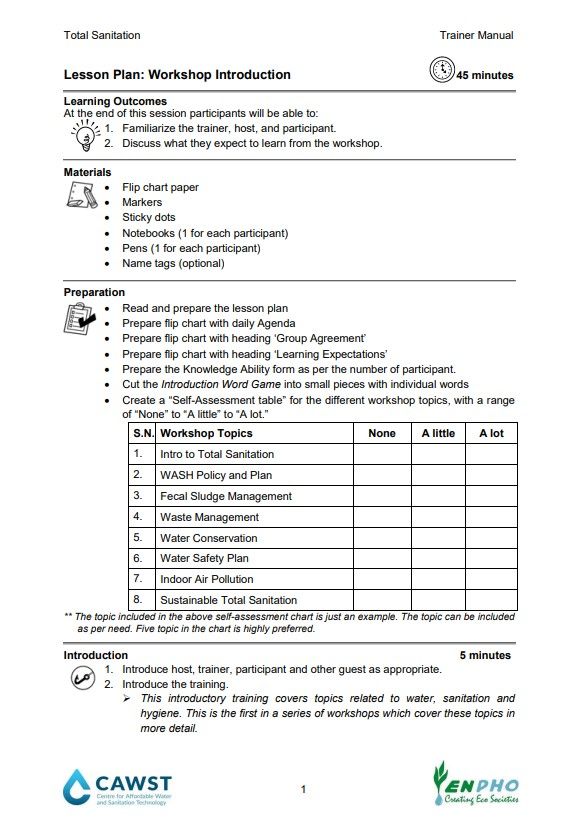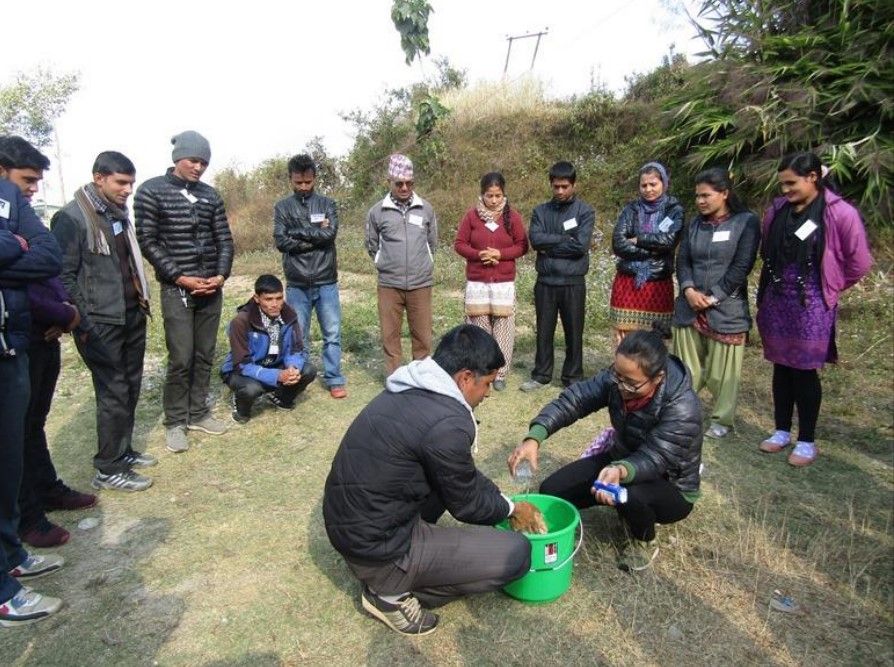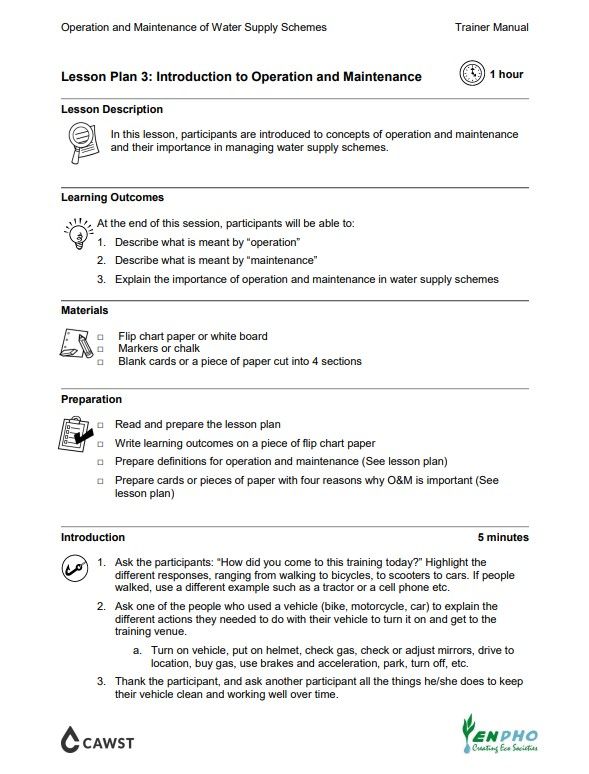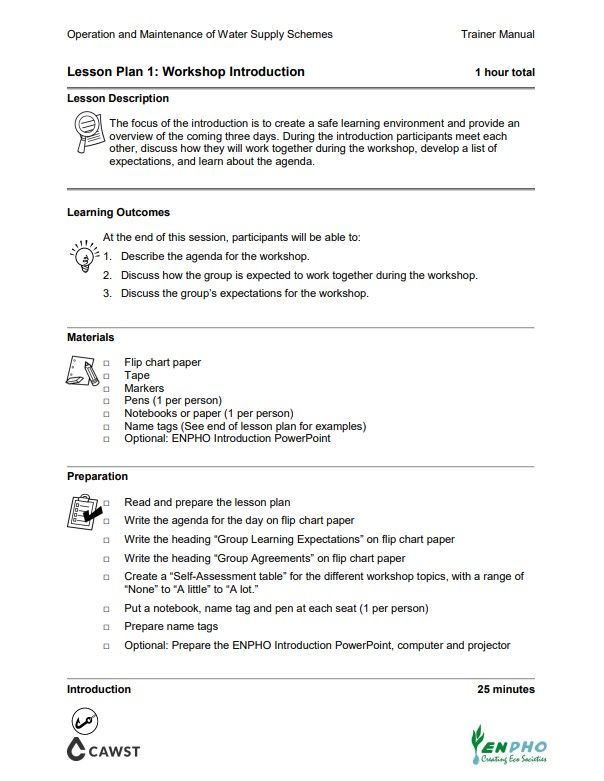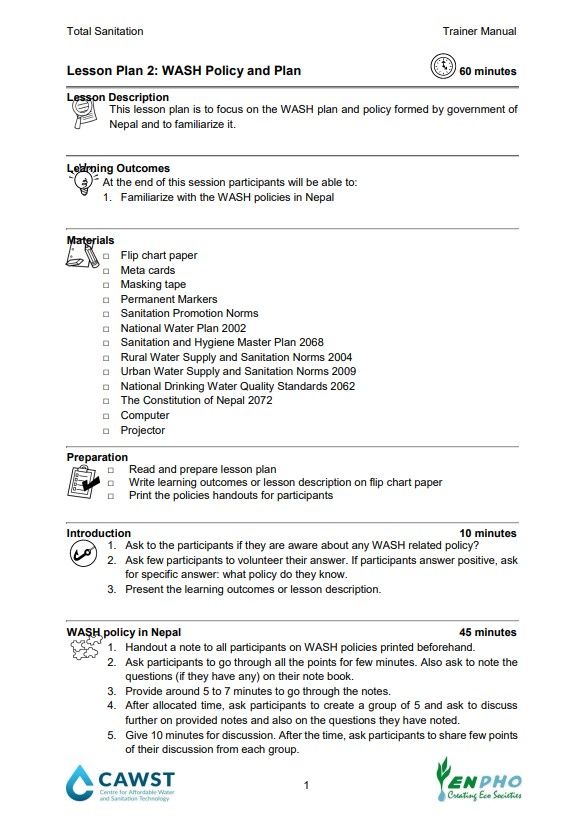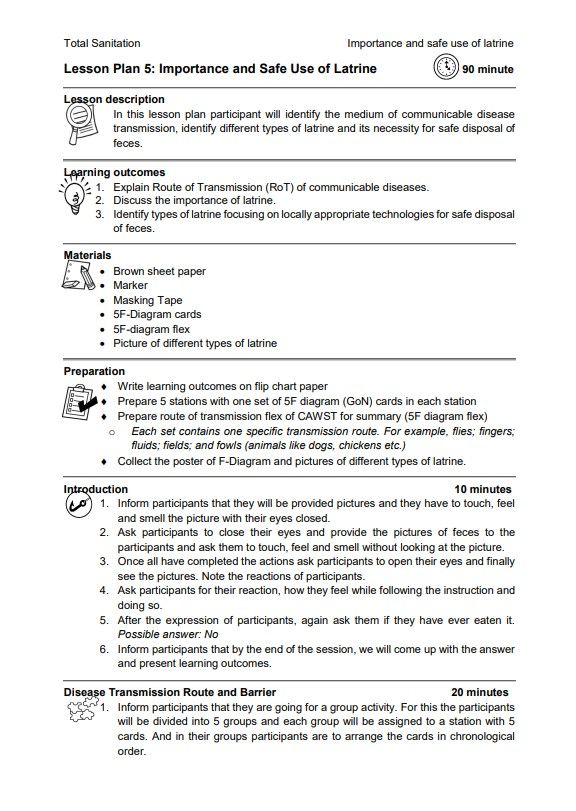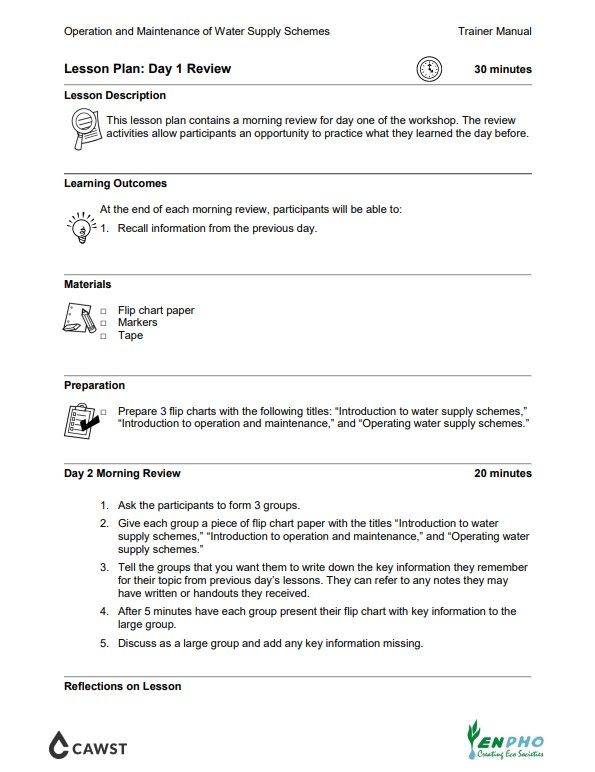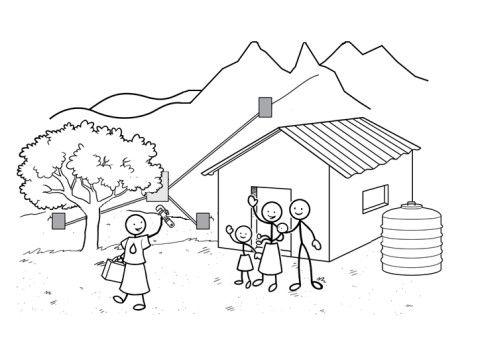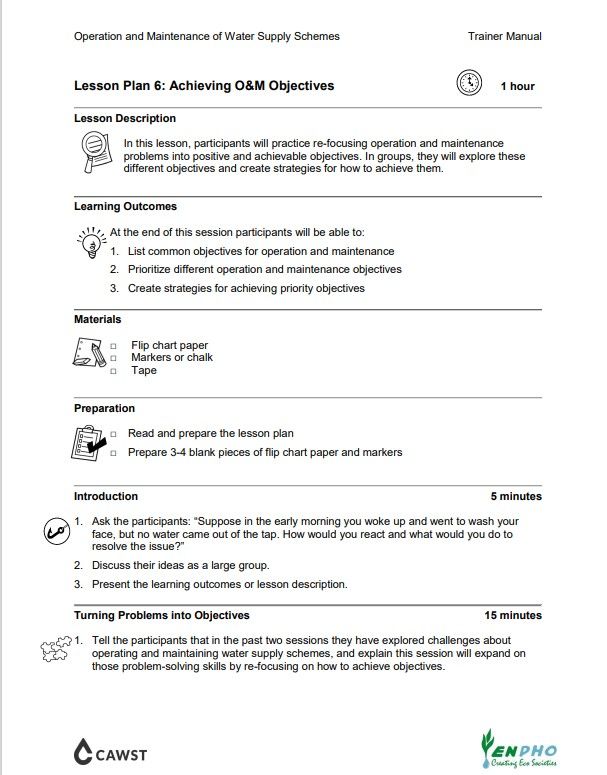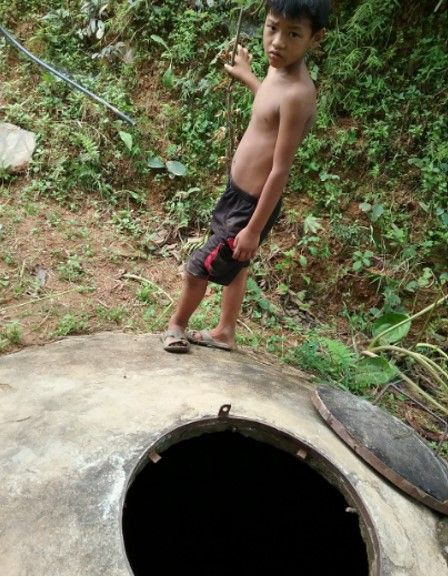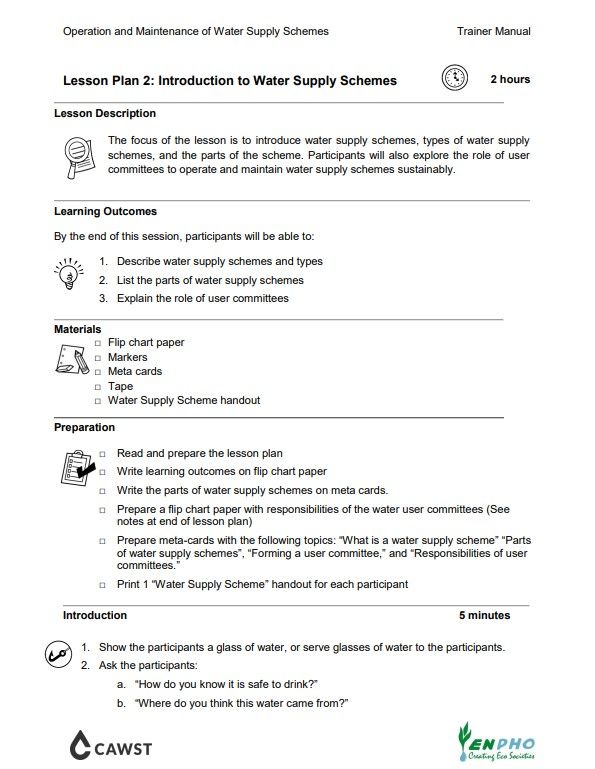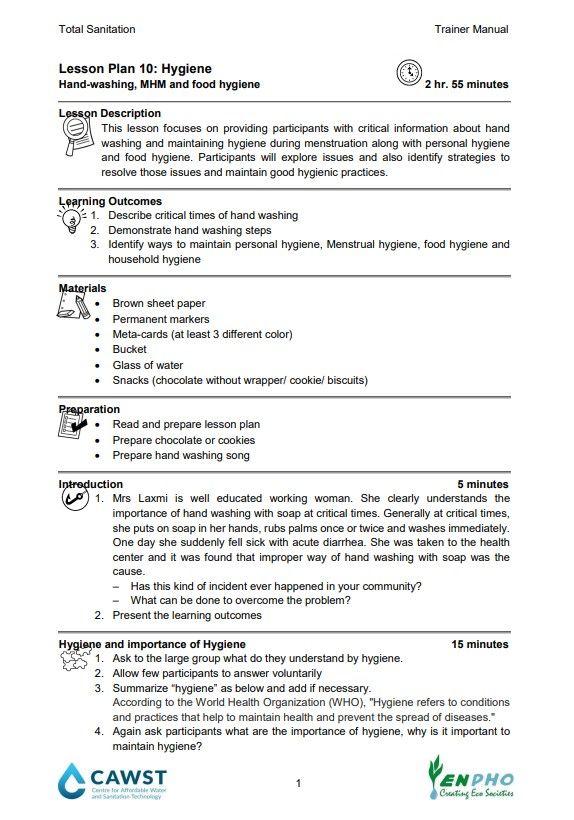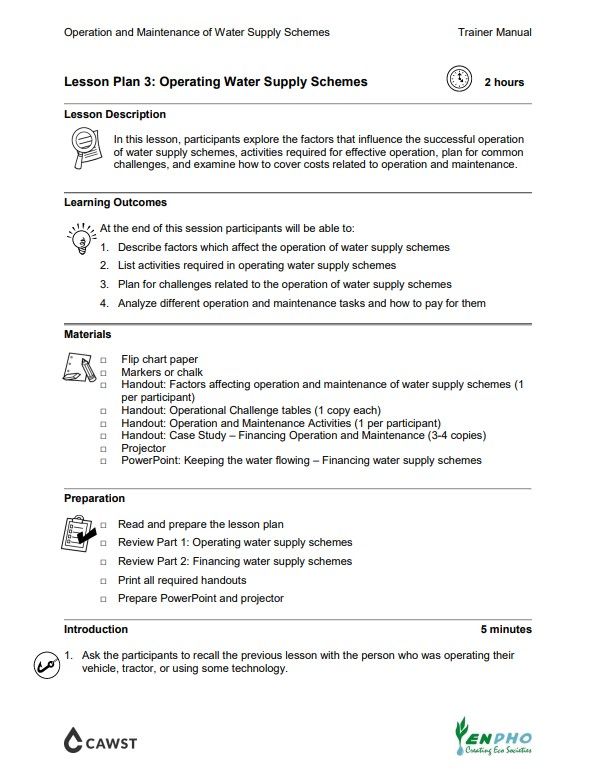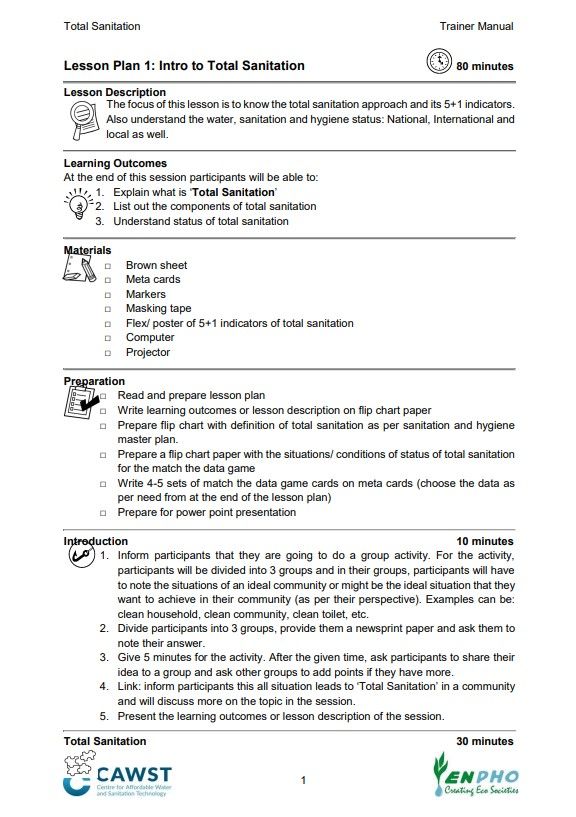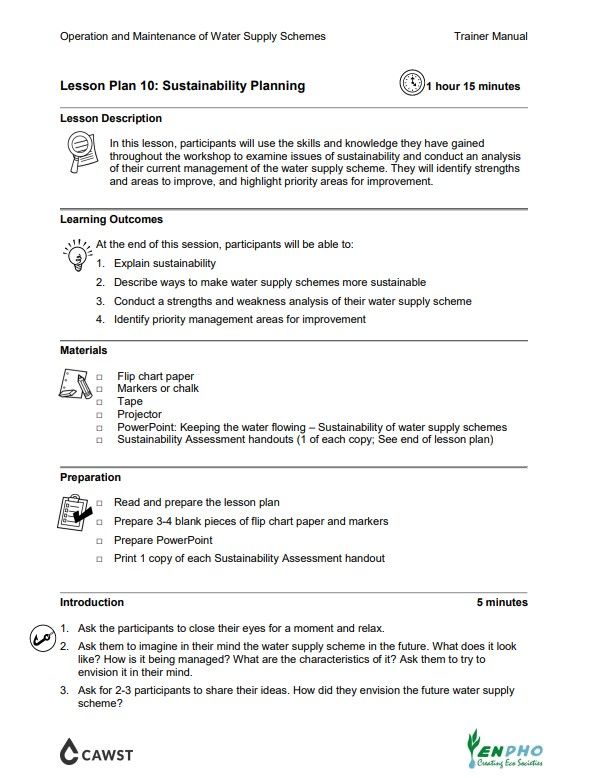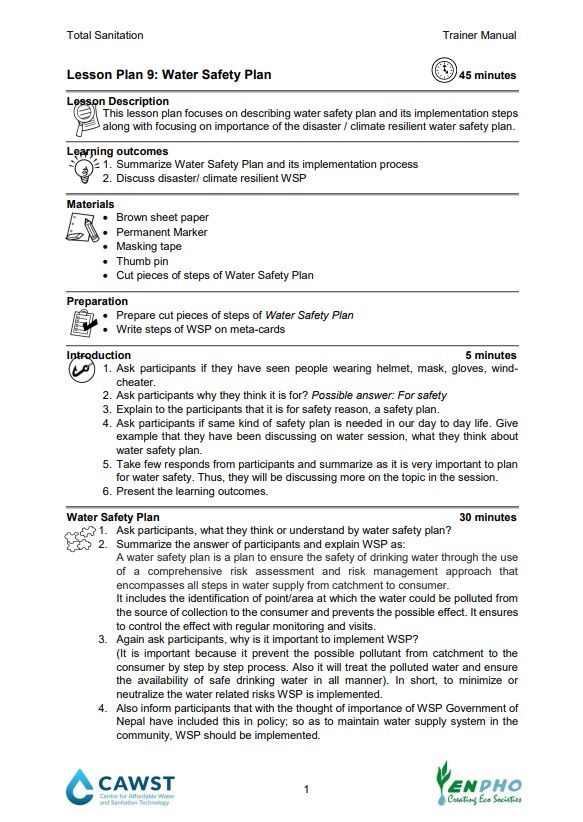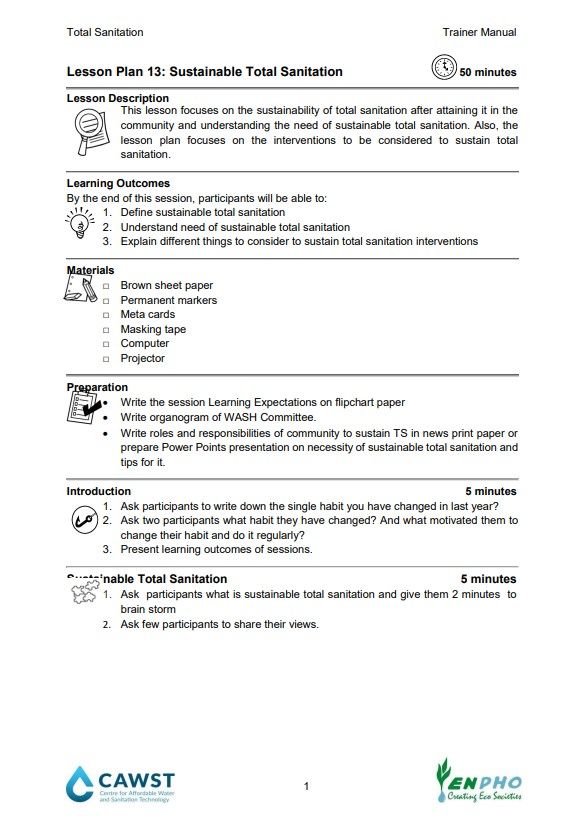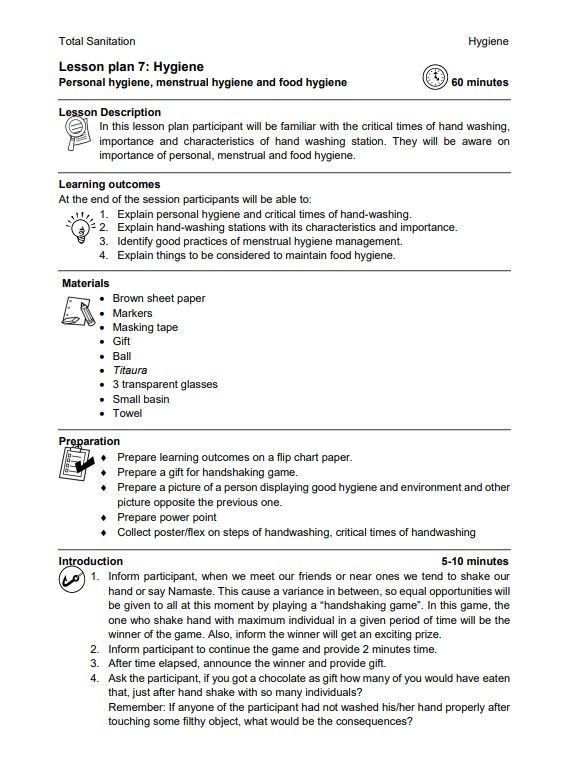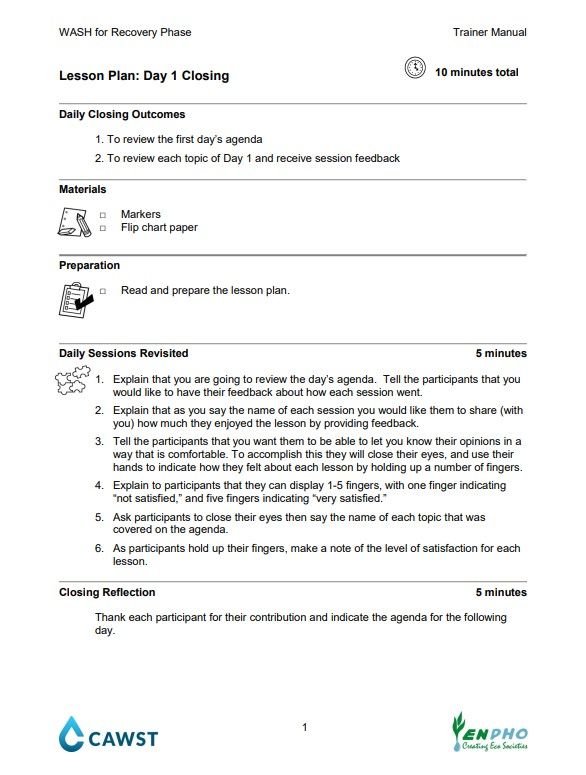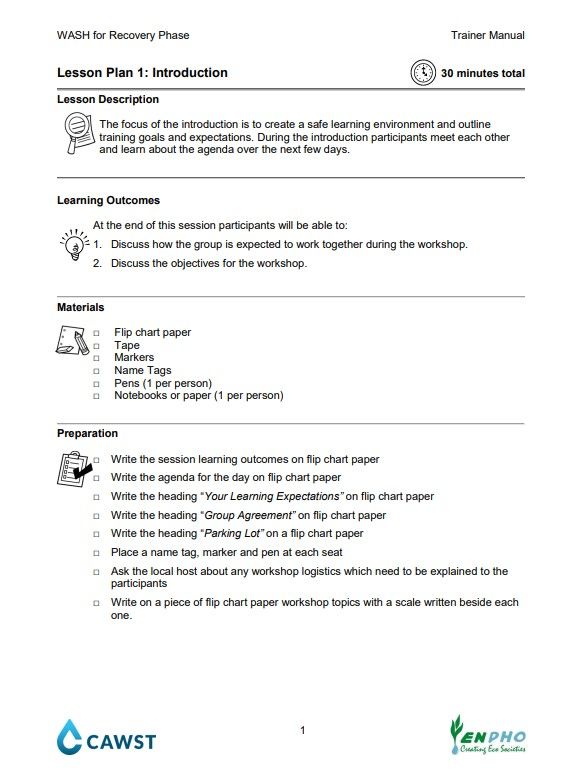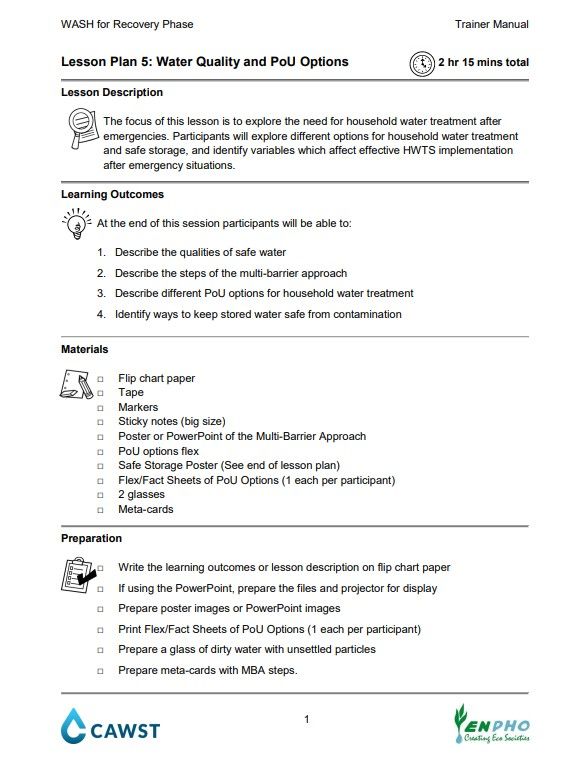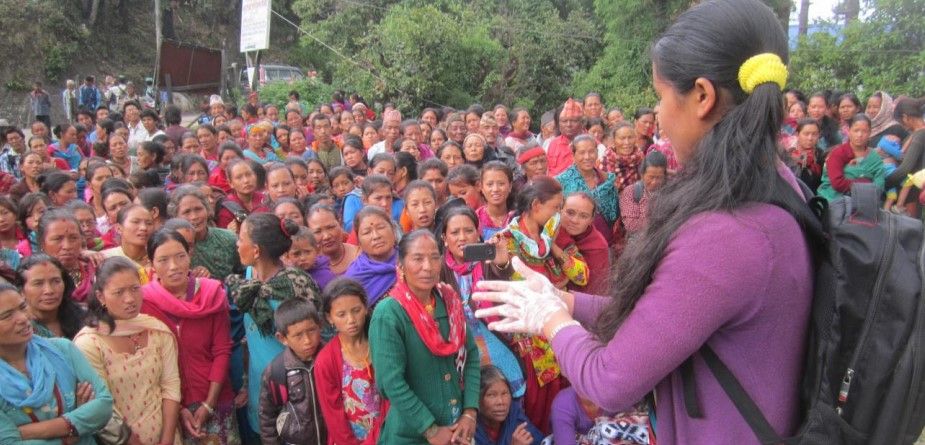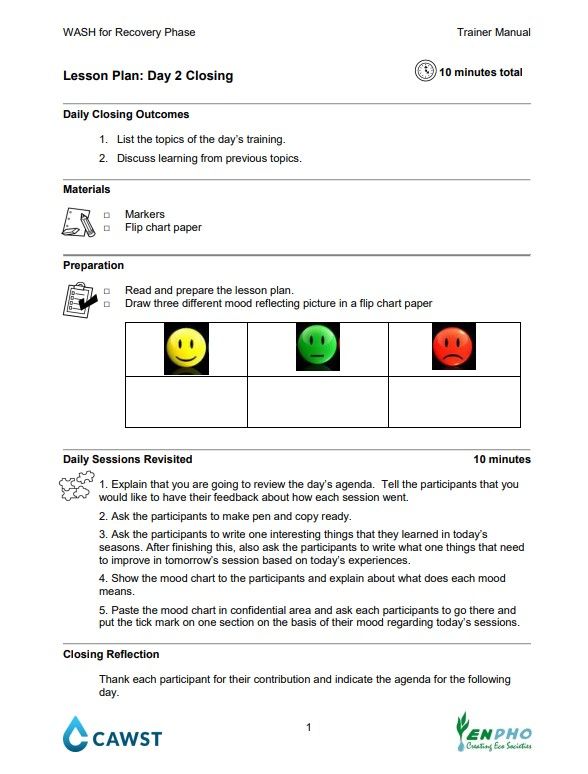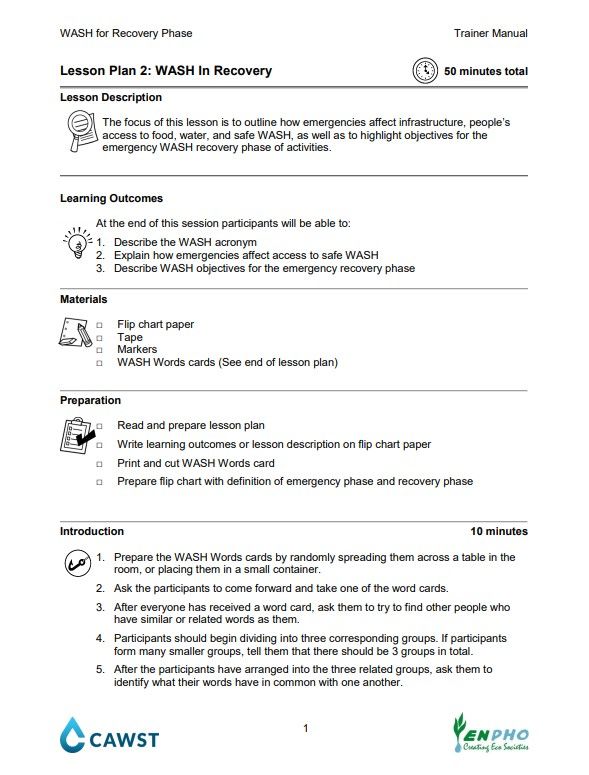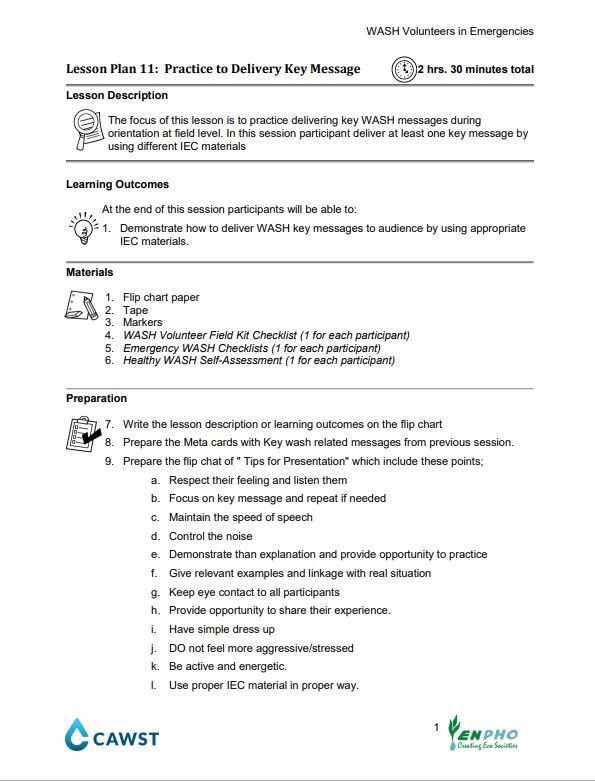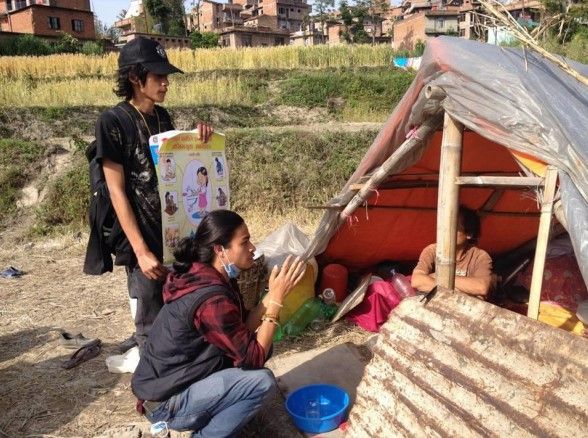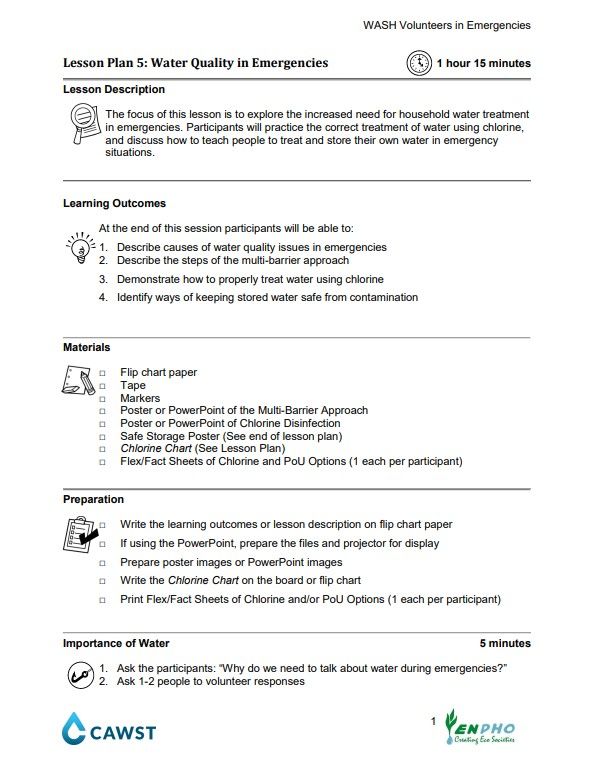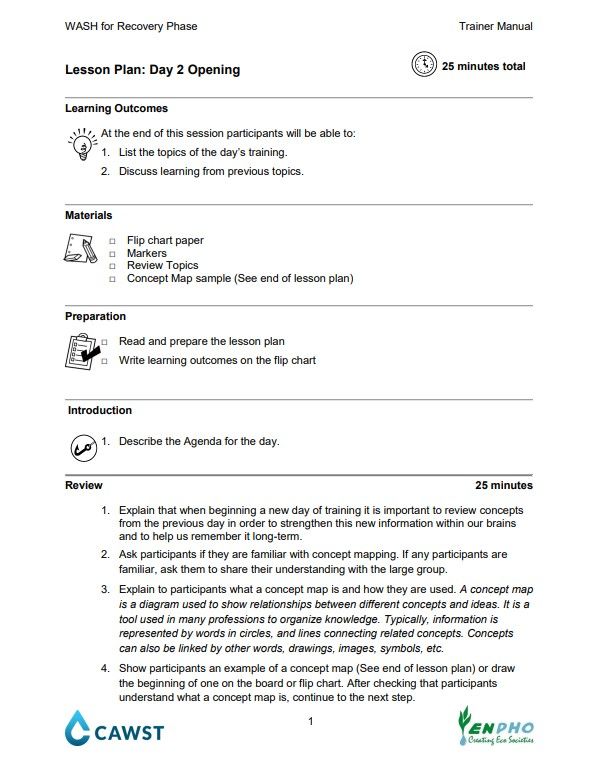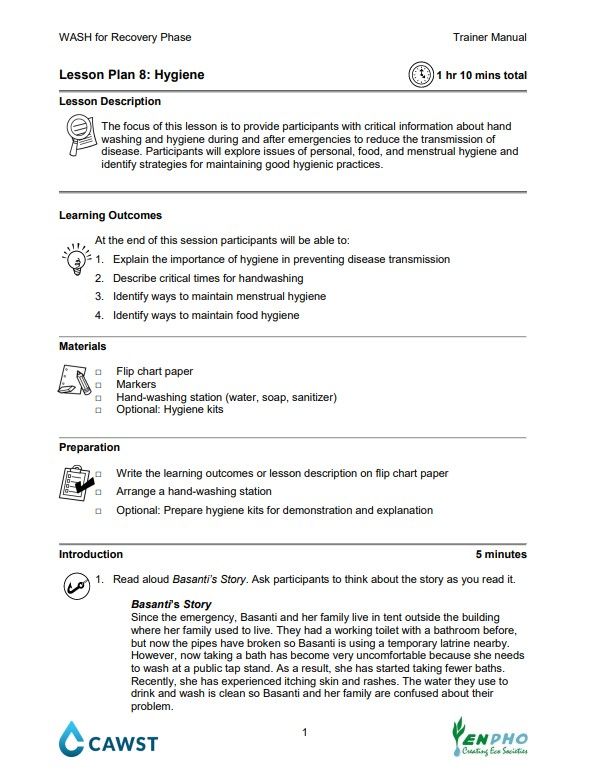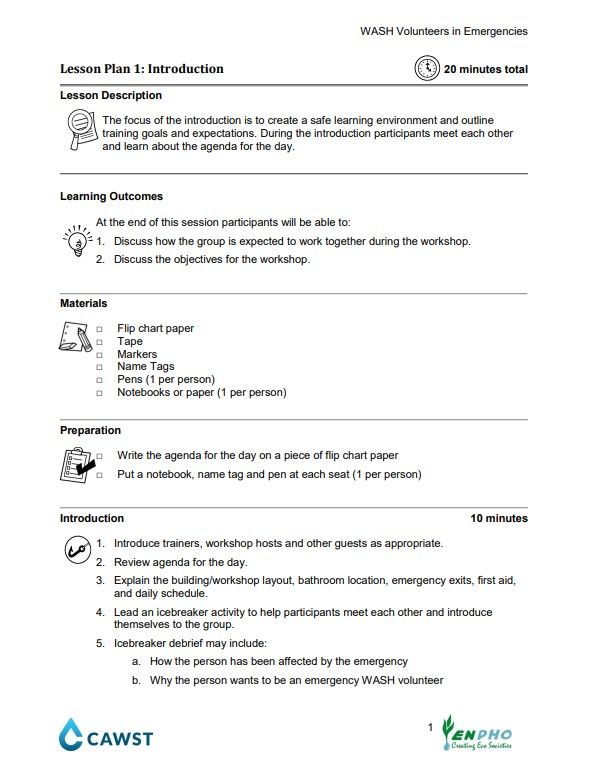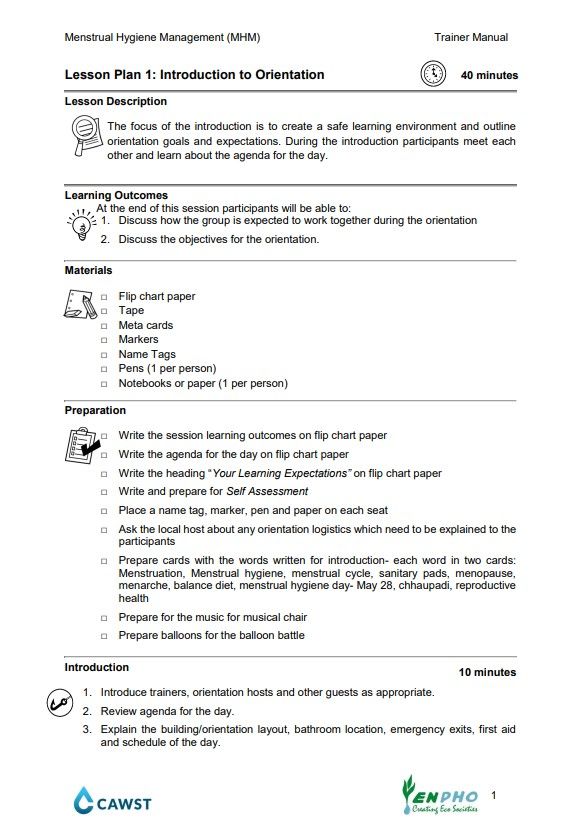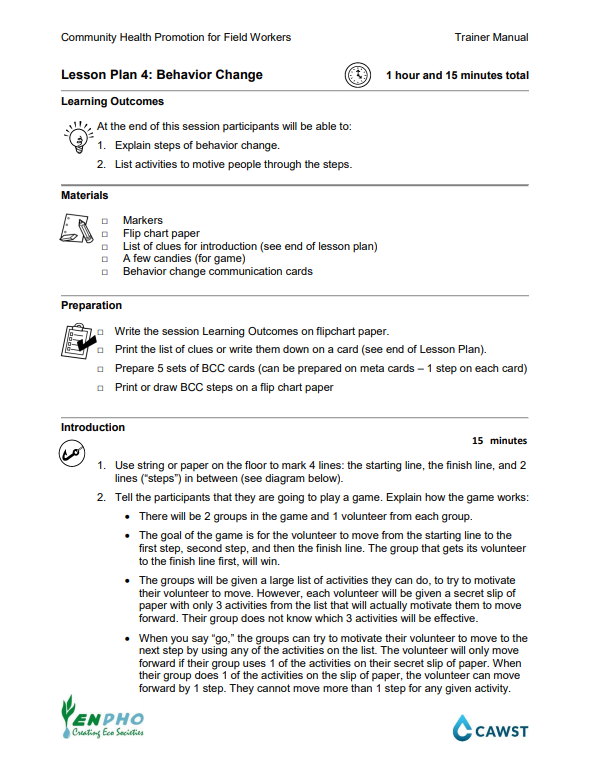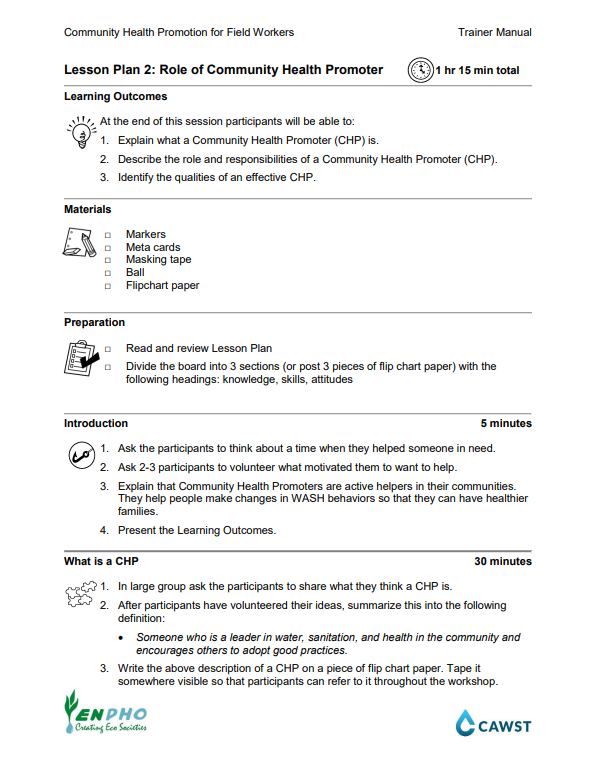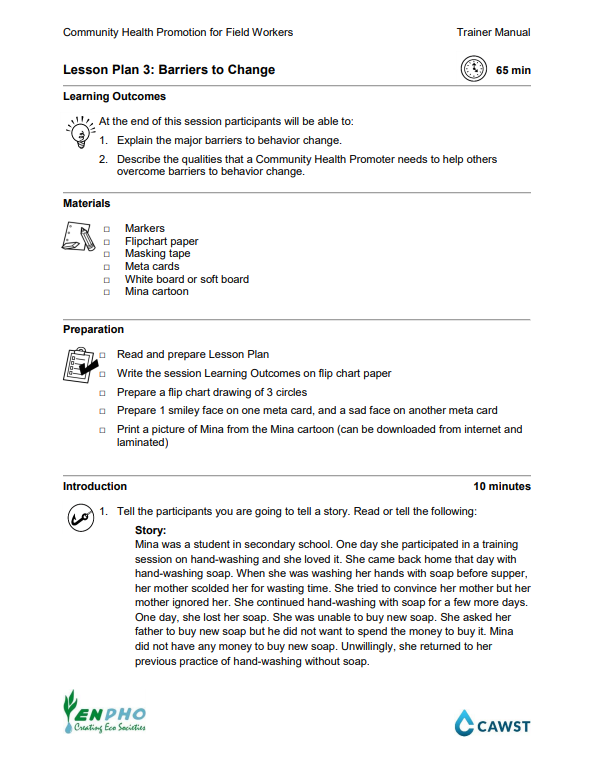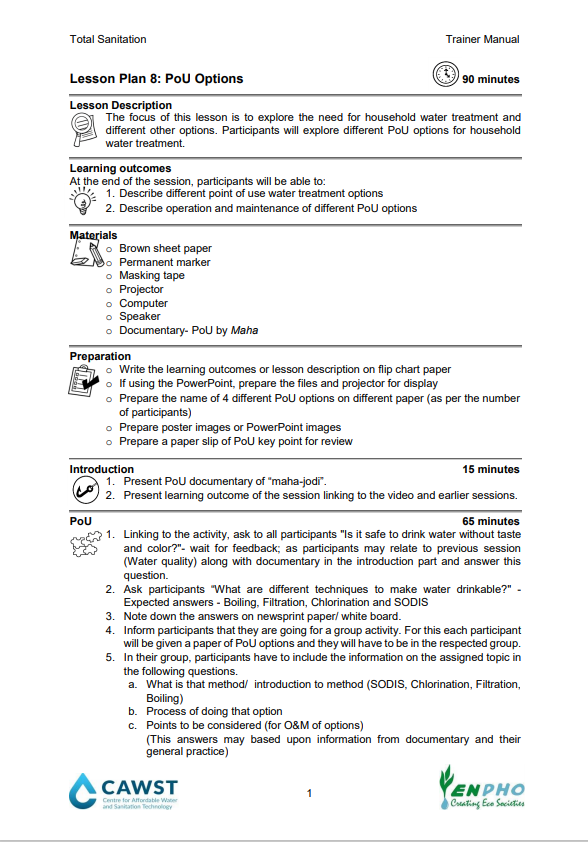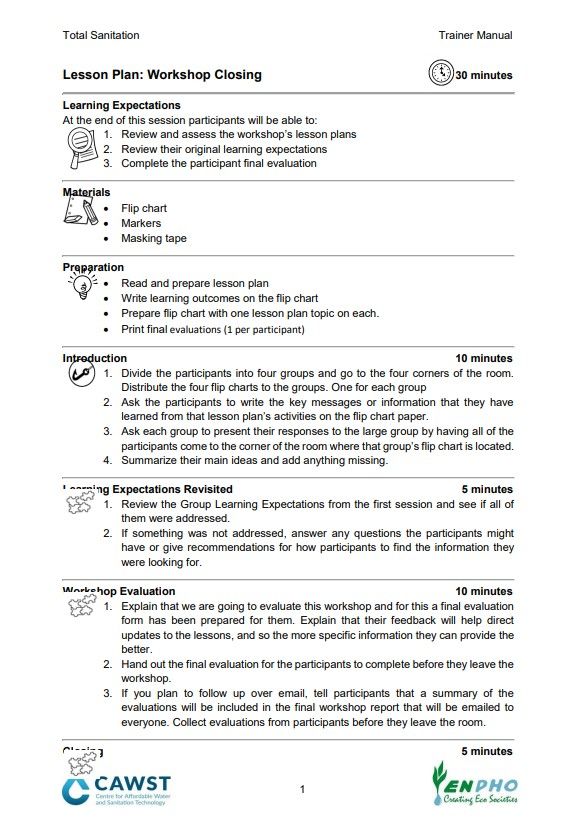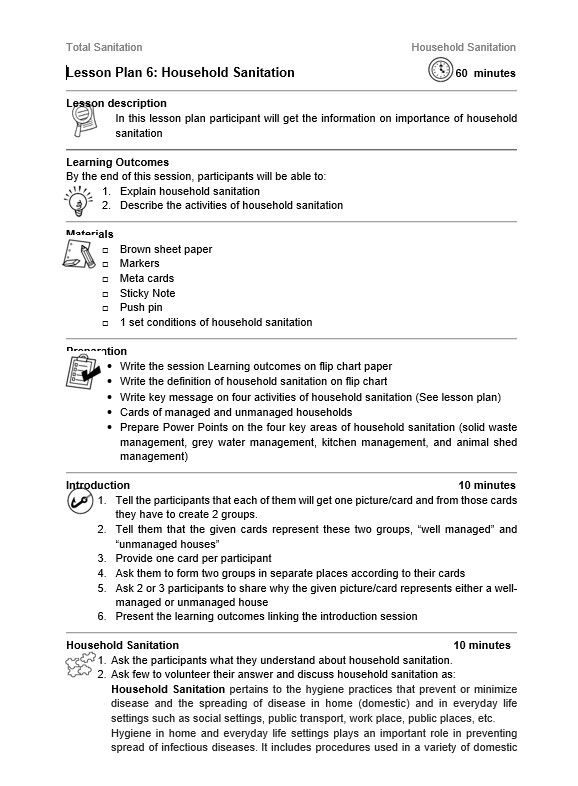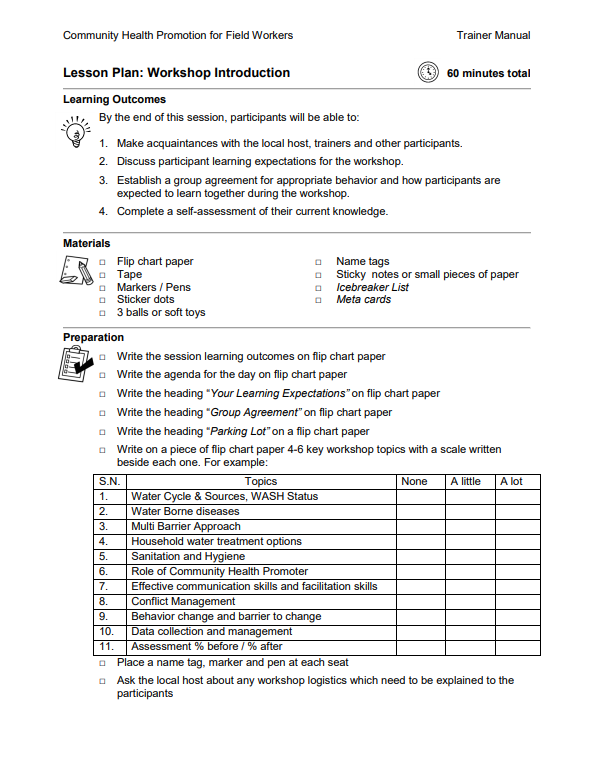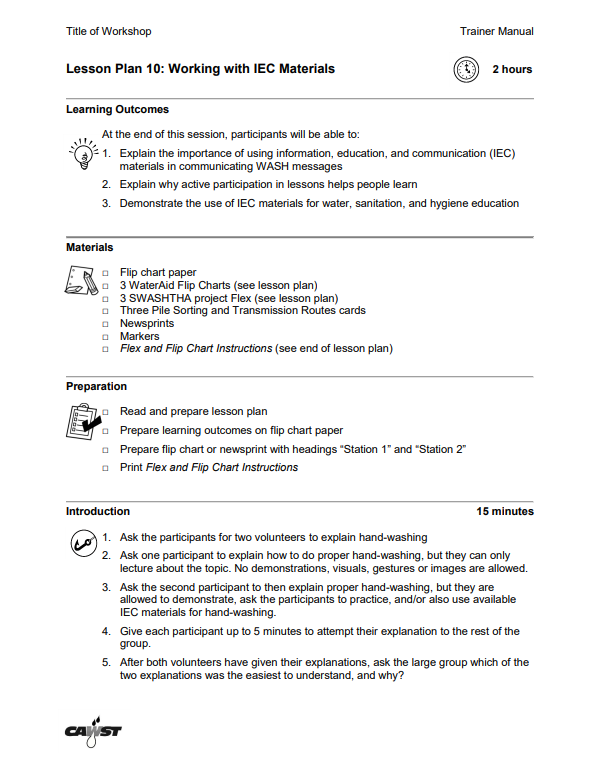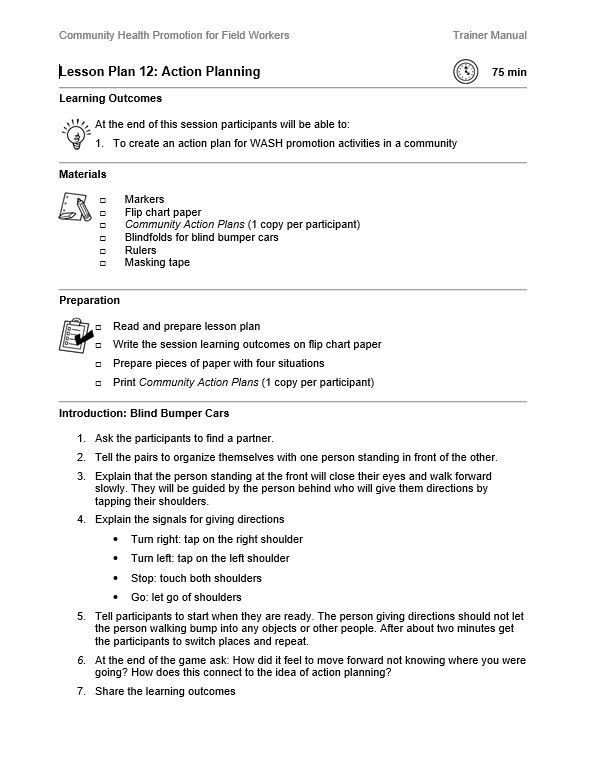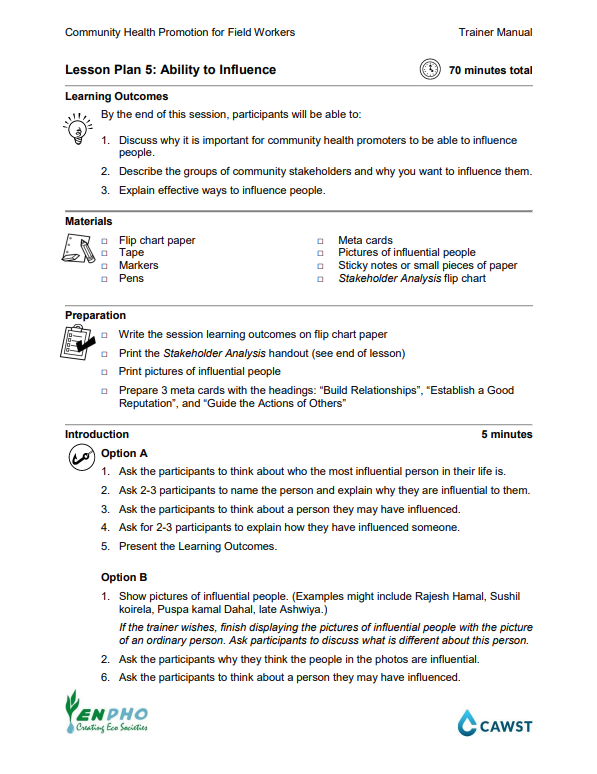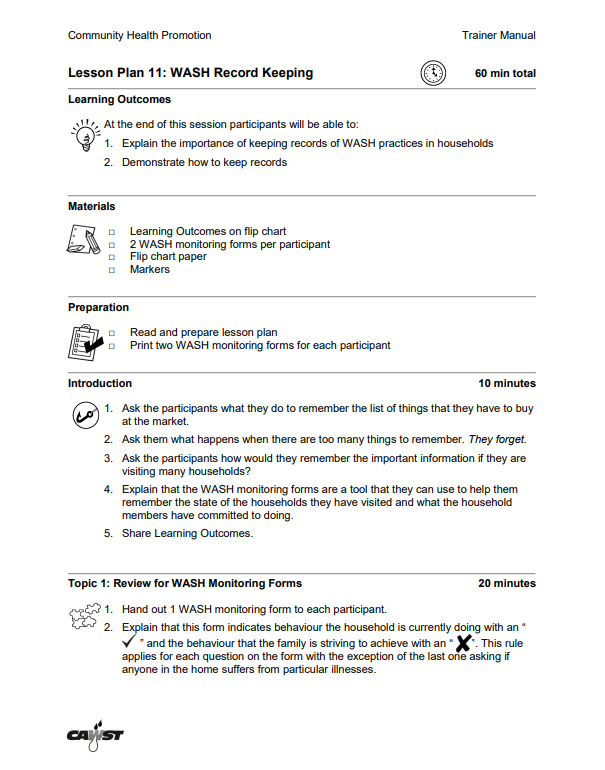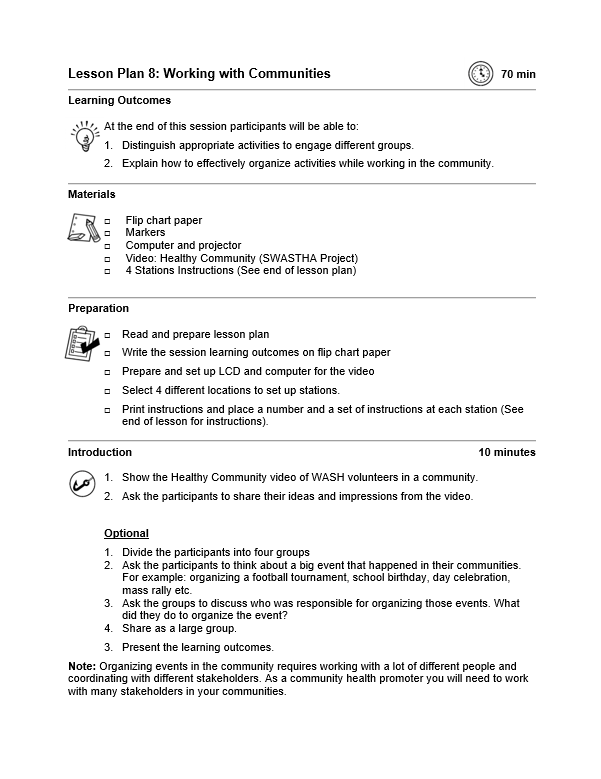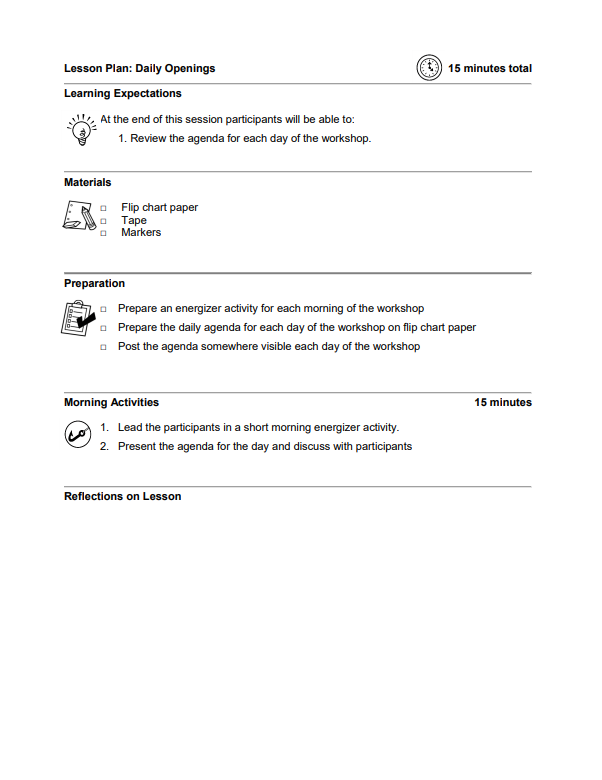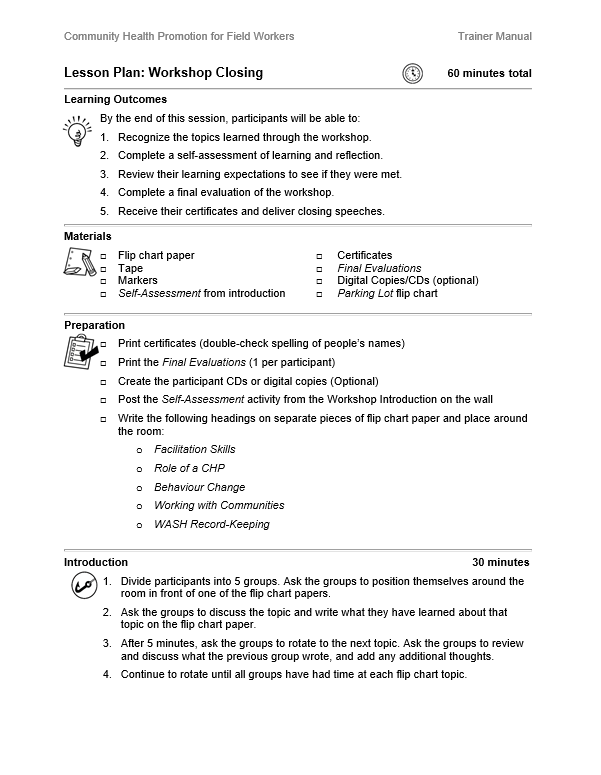Resources by Environment & Public Health Organization
Training Toolkit – WASH and Climate Change
A complete training package with a facilitator manual and slide presentation to teach the links between WASH and climate change through participatory learning.
Languages
English
Presentation Slides - WASH and Climate Change Training
A complete slide deck with presenter notes to support WASH and climate change training. Can also be shared with participants for learning and review.
Languages
English
Trainer Manual - WASH and Climate Change
A comprehensive training manual to build awareness and action on climate change impacts and solutions in WASH programs through participatory learning.
Languages
English
Facilitation Skills
This is a lesson plan that describes the difference between hearing and listening and explains the benefits of active listening.
Languages
English
Action Planning - Lesson Plan (Intro to WASH Nepal)
This lesson helps participants to create a personal action plan.
Languages
English
Day 2 Closing - Lesson Plan (CHP Nepal)
This is an optional lesson plan for the Community Health Promotion Nepal workshop about how to review the concepts covered in Day 2.
Languages
English
Day 1 Closing - Lesson Plan (CHP Nepal)
This is an optional lesson plan for the Community Health Promotion Nepal workshop about how to review the concepts covered in Day 1.
Languages
English
WASH Behaviors and Disease Transmission - Lesson Plan (WASH-R Nepal)
The focus of this lesson is to highlight the connection between different WASH behaviors and the spread of disease. Participants will explore different ways water-related disease can be transmitted and the different ways of preventing this transmission within communities.
Languages
English
Community Health Promotion (CHP Nepal) Workshop
This workshop is designed for those who are interested in delivering training on community health promotion. It includes lessons plans and guidance on training delivery.
Languages
English
WASH in Schools (WiS Nepal) Workshop
This collection is intended to support people who facilitate WASH in School. It is based on the practical experience of the Environment and Public Health Organization (ENPHO) and the Centre for Affordable Water and Sanitation Technology (CAWST). It has been developed specifically for the context of Nepal.
Languages
English
Emergency WASH for Volunteers (E-WASH Nepal) Workshop
This collection is for trainers who are interested in delivering training on Emergency WASH for volunteers in the context of Nepal. It was developed following the 2015 earthquake in Nepal. It includes lesson plans, agendas, and guidance on training delivery.
Languages
English
Total Sanitation (3-Day Nepal) Workshop
This workshop is especially designed targeting total sanitation in community. With the whim of attaining open defecation free, the focus is shifted in constructing latrine; the quantitative goal only. However, this workshop is more focused on WASH details and headed to achieve safe water, improved sanitation, proper hygiene and their sustainability. Along with total sanitation, the flavor of delivering effective training adds up more weightage in training, with knowledge enhance the knowledge as well as skill of the trainer.
Languages
English
Total Sanitation (2-Day Nepal) Workshop
This workshop, 2 days training on Total Sanitation, is the first in a series targeting the community who has achieved the ODF situation. This training is the level after declaration of ODF. The workshop uses participatory methods to cover the Concept and Importance of Total Sanitation, Components of Total Sanitation, Water quality, Points of Use options, importance and safe use of latrine, household Sanitation, Hygiene, Key message on Total Sanitation, and Tips on communicating with groups.
Languages
English
WASH for Recovery (WASH-R Nepal) Workshop
This workshop is intended to support people who facilitate WASH awareness workshops. It is based on the practical experience of the Environment and Public Health Organization (ENPHO) and the Centre for Affordable Water and Sanitation Technology (CAWST). It has been developed specifically for the context of Nepal. The lessons are for WASH promoters and work well for participants with low levels of literacy. Each lesson comes with the materials needed or instructions on how to build the necessary materials.
Languages
English
Environmental Sanitation - Lesson Plan (TS3 Nepal)
This lesson plan focuses on the description of environmental sanitation and the role of individual, household and community to attain environment sanitation.
Languages
English
Keeping School Clean - Lesson Plan (WiS Nepal)
The lesson focuses on the meaning of waste and types of waste that is generally found in school premises. The lesson plan also discuss on various techniques and practices to manage such waste generated in school.
Languages
English
Workshop Closing - Lesson Plan (MHM Nepal)
In the workshop closing, participants review what they learned, evaluate the workshop, and receive a certificate.
Languages
English
Maintaining Hygiene - Lesson Plan (WiS Nepal)
The focus of this lesson is to discuss on the critical times of hand washing along with the importance of hand washing. Also the lesson plan focuses on discussion on sanitation multiple table for maintaining personal hygiene. While discussing on personal hygiene, menstrual hygiene management in school is also emphasized.
Languages
English
Menstrual Hygiene Management Nepal Trainer Manual
This manual is for trainers who are interested in delivering training on Menstrual Hygiene Management in the context of Nepal. It includes lesson plans, agendas, forms, and guidance on training delivery.
Languages
English
Vulnerable Populations - Lesson Plan (Intro to WASH Nepal)
This lesson plan identifies vulnerable population groups in a community and explains how a WASH volunteer/CHP/Individual can support vulnerable people.
Languages
English
Day 2 Opening - Lesson Plan (WiS Nepal)
This lesson plan contains a morning review from day one of the workshop. The review activities allow participants an opportunity to practice what they learned the day before.
Languages
English
Gender and WASH - Lesson Plan (Intro to WASH Nepal)
This lesson classifies WASH activities by gender at the household and community level, describes the relationship between gender and WASH, and explains how to create gender balance in WASH-related activities at the household level.
Languages
English
Transmission Routes - Lesson Plan (Intro to WASH Nepal)
This lesson plan illustrates transmission routes of water-related diseases and explains how to prevent water-related disease transmission.
Languages
English
Menstrual Hygiene Management - Lesson Plan (MHM Nepal)
The focus of this lesson is to share information about menstrual hygiene, the key components of menstrual hygiene management, and discuss on the good and bad behaviors practiced during menstruation.
Languages
English
Emergency WASH - Lesson Plan (WiS Nepal)
The lesson discusses on the minimum WASH requirement in school at the time of emergency along with listing the materials required for the stock piling in school for the reference during emergency period.
Languages
English
School WASH Assessment Form
This form is meant to be used with the WASH in School Lesson Plan of the WASH in Schools Nepal workshop.
Languages
English
Workshop Closing - Lesson Plan (Intro to WASH Nepal)
This lesson plan reviews the information covered in the Introduction to WASH Nepal workshop and assesses participants' learning.
Languages
English
Safe Water and PoU Options - Lesson Plan (WiS Nepal)
The focus of this lesson is to differentiate between clean water and safe water. Also, this lesson focuses on the point of use that is effective at school level including the demonstration of use of chlorine.
Languages
English
Roles and Responsibilities - Lesson Plan (WiS Nepal)
The focus of this lesson is on identifying the responsible stakeholders to make WASH sustainable in school. Also, the lesson targets on the roles of all the stakeholders that is responsible to make WASH sustainable in school and importance of getting involved in WASH of all stakeholders.
Languages
English
Workshop Closing - Lesson Plan (WiS Nepal)
In the workshop closing, participants review what they learned and evaluate the workshop. The final closing is an opportunity to consolidate participants’ learning, gather feedback, and celebrate successes.
Languages
English
WASH in Schools Nepal Trainer Manual
This manual is for trainers who are interested in delivering training on WASH in Schools in the context of Nepal. It includes lesson plans, agendas, forms, and guidance on training delivery.
Languages
English
Workshop Introduction - Lesson Plan (WiS Nepal)
The focus of the introduction is to create a safe learning environment and provide an overview of the coming days. During the introduction participants meet each other, discuss how they will work together during the workshop, develop a list of expectations, and learn about the agenda.
Languages
English
Menstruation - Lesson Plan (MHM Nepal)
The focus of the lesson is to know experiences of first menstruation, become familiar with the term menstruation, myths and misconceptions related to menstruation. This helps students to talk confidently and accurately about menstruation.
Languages
English
Introduction to WASH Nepal Trainer Manual
This manual is for trainers who are interested in delivering training on Introduction to WASH in the context of Nepal. It includes lesson plans, agendas, forms, and guidance on training delivery.
Languages
English
Day 1 Closing - Lesson Plan (Intro to WASH Nepal)
This lesson plan reviews the information from day 1 of the Introduction to WASH Nepal workshop.
Languages
English
Menstrual Cycle - Lesson Plan (MHM Nepal)
This lesson focuses on the general idea about female reproductive organs and the menstrual cycle.
Languages
English
Day 2 Opening - Lesson Plan (Intro to WASH Nepal)
This lesson plan reviews the information from day 1 of the Introduction to WASH Nepal workshop and discusses the topics to be covered in day 2.
Languages
English
Roles and Responsibilities of MHM - Lesson Plan (MHM Nepal)
The focus of this lesson is to highlight the roles and responsibilities of teachers, family, and friends in effective menstrual hygiene management.
Languages
English
Workshop Introduction - Lesson Plan (Intro to WASH Nepal)
This lesson plan explains how to open the workshop "Introduction to WASH".
Languages
English
Introduction to WASH - Lesson Plan (Intro to WASH Nepal)
This lesson plan explains the acronym WASH, identifies some common diseases related to poor WASH practices, and discusses how poor WASH practices may affect people’s lives.
Languages
English
WASH in Schools - Lesson Plan (WiS Nepal)
The focus of this lesson is to allow the participant to understand WASH acronym and WASH in School. Participants will learn importance of WASH in school. Participants will identify standards of WASH facilities in school.
Languages
English
Transmission Routes - Lesson Plan (WiS Nepal)
This lesson plan focuses on the route of transmission of pathogen from feces to mouth including the possible blockage of the routes.
Languages
English
WASH in Schools Nepal Final Evaluation
This is the final evaluation template for participants to provide feedback, and for trainers to assess participants' knowledge/ability after a WASH in Schools Nepal workshop.
Languages
English
Maintaining Water Supply Schemes - Lesson Plan (O&M Nepal)
In this lesson, participants learn about different types of maintenance and explore the activities necessary to maintain water supply schemes over time. Participants will also create a plan for maintenance activities.
Languages
English
O&M of Water Supply Schemes Nepal Participant List
This participant list template is a tool that will help you keep a database of participant information for your Operation & Maintenance of Water Supply Schemes in the context of Nepal workshop.
Languages
English
Workshop Introduction - Lesson Plan (TS3 Nepal)
The focus of the introduction is to create a safe learning environment and provide an overview of the coming three days. During the introduction participants meet each other, discuss how they will work together during the workshop, develop a list of expectations, and learn about the agenda.
Languages
English
Operating Water Supply Schemes - Presentation (O&M Nepal)
This presentation is used to support the Operating Water Supply Schemes Lesson Plan (O&M Nepal). It addresses financing operation and maintenance of water supply schemes.
Languages
English
O&M of Water Supply Schemes Nepal 3 Day Agenda for Participants
This is the basic 3-day agenda for participants attending the Operation & Maintenance of Water Supply Schemes in the context of Nepal workshop.
Languages
English
Day 1 Closing - Lesson Plan (TS2 Nepal)
This lesson plan contains a review for day one of the workshop. The review activities allow participants an opportunity to practice what they learned during the day.
Languages
English
Total Sanitation (2-Day) Nepal Trainer Manual
This manual is for trainers who are interested in delivering 2-day training on Total Sanitation in the context of Nepal. It includes lesson plans, agendas, and guidance on training delivery.
Languages
English
Practicing O&M Skills - Presentation (O&M Nepal)
This presentation is used to support the Practicing Operation & Maintenance Skills Lesson Plan (O&M Nepal). It covers using the ENPHO Water Testing Field Kit.
Languages
English
Intro to Operation & Maintenance - Lesson Plan (O&M Nepal)
In this lesson, participants are introduced to concepts of operation and maintenance and their importance in managing water supply schemes.
Languages
English
Workshop Introduction - Lesson Plan (O&M Nepal)
The focus of the introduction is to create a safe learning environment and provide an overview of the coming three days. During the introduction participants meet each other, discuss how they will work together during the workshop, develop a list of expectations, and learn about the agenda.
Languages
English
WASH Policy and Plan - Lesson Plan (TS3 Nepal)
This lesson plan is to focus on the WASH plan and policy formed by government of Nepal and to familiarize it.
Languages
English
O&M of Water Supply Schemes Nepal Workshop Outline
This outline describes the content, objectives, and audience for the Operation & Maintenance of Water Supply Schemes in the context of Nepal workshop.
Languages
English
Importance and Safe Use of Latrines - Lesson Plan (TS2 Nepal)
In this lesson plan participant will identify the medium of communicable disease transmission, identify different types of latrine and its necessity for safe disposal of feces.
Languages
English
Day 1 Closing - Lesson Plan (O&M Nepal)
This lesson plan contains a review for day one of the workshop. The review activities allow participants an opportunity to practice what they learned during the day.
Languages
English
Operation & Maintenance of Water Supply Schemes Nepal Trainer Manual
This manual is for trainers who are interested in delivering training on Operation & Maintenance of Water Supply Schemes in the context of Nepal. It includes lesson plans, agendas, forms, and guidance on training delivery.
Languages
English
Workshop Introduction - Lesson Plan (TS2 Nepal)
The focus of the introduction is to create a safe learning environment and provide an overview of the coming two days. During the introduction participants meet each other, discuss how they will work together during the workshop, develop a list of expectations, and learn about the agenda.
Languages
English
O&M of Water Supply Schemes Nepal Final Evaluation Summary
This is a template for displaying the final results of your participant evaluations for the Operation & Maintenance of Water Supply Schemes in the context of Nepal workshop.
Languages
English
Components of Total Sanitation - Lesson Plan (TS2 Nepal)
In this lesson plan, participants find the main components of total sanitation and the sub-components that are under the main components of the total sanitation.
Languages
English
Achieving O&M Objectives - Lesson Plan (O&M Nepal)
In this lesson, participants will practice re-focusing operation and maintenance problems into positive and achievable objectives. In groups, they will explore these different objectives and create strategies for how to achieve them.
Languages
English
Sustainability Planning - Presentation (O&M Nepal)
This presentation is used to support the Sustainability Planning Lesson Plan (O&M Nepal). It addresses planning for the sustainability of water supply schemes.
Languages
English
Practicing O&M Skills - Lesson Plan (O&M Nepal)
This lesson focuses on the introduction of tools and fittings for operation and maintenance activities of water supply schemes. It allows participants hands-on practice to make or adapt locally available HDP fittings and thread cutting of GI pipe.
Languages
English
Link to WASH - Lesson Plan (O&M Nepal)
The lesson plan focuses on the importance of WASH for community health, its link to the water supply scheme, and the role of the water supply user committee in advocating for better WASH practices. Participants will also understand disease transmission routes and the link between WASH practices.
Languages
English
Key Messages on Total Sanitation - Lesson Plan (TS2 Nepal)
In this lesson plan, participant will get the key message on water, sanitation, hygiene, safe and hygienic food, kitchen management.
Languages
English
Water Conservation - Lesson Plan (TS3 Nepal)
The focus of this lesson is to share the importance of water conservation, various techniques to conserve water along with use of alternate source of water; rain water as a solution to water scarcity.
Languages
English
Intro to Water Supply Schemes - Lesson Plan (O&M Nepal)
The focus of the lesson is to introduce water supply schemes, types of water supply schemes, and the parts of the scheme. Participants will also explore the role of user committees to operate and maintain water supply schemes sustainably.
Languages
English
Hygiene - Lesson Plan (TS3 Nepal)
This lesson focuses on providing participants with critical information about hand washing and maintaining hygiene during menstruation along with personal hygiene and food hygiene. Participants will explore issues and also identify strategies to resolve those issues and maintain good hygienic practices.
Languages
English
Water Quality - Lesson Plan (TS3 Nepal)
The focus of this lesson is to explain safe water and differentiate clean water and filthy water.
Languages
English
Operating Water Supply Schemes - Lesson Plan (O&M Nepal)
In this lesson, participants explore the factors that influence the successful operation of water supply schemes, activities required for effective operation, plan for common challenges, and examine how to cover costs related to operation and maintenance.
Languages
English
Indoor Air Pollution - Lesson Plan (TS3 Nepal)
This lesson focuses on describing indoor air pollution, main causes of air pollution inside house. This lesson plan also discuss impacts of indoor air pollution and identifies the 4 possible solutions to mitigate the indoor air pollution.
Languages
English
Tips on Communicating with Groups - Lesson Plan (TS2 Nepal)
In this lesson plan, participant will acquire the tips to communicate in the group.
Languages
English
Introduction to Total Sanitation - Lesson Plan (TS3 Nepal)
The focus of this lesson is to know the total sanitation approach and its 5+1 indicators. Also understand the water, sanitation and hygiene status: National, International and local as well.
Languages
English
Waste Management - Lesson Plan (TS3 Nepal)
The focus of this lesson is to identify and explain types of waste and describe its different management techniques and practices.
Languages
English
Maintaining Water Supply Schemes - Presentation (O&M Nepal)
This presentation is used to support the Maintaining Water Supply Schemes Lesson Plan (O&M Nepal). It addresses identifying maintenance issues with water supply schemes.
Languages
English
Sustainability Planning - Lesson Plan (O&M Nepal)
In this lesson, participants will use the skills and knowledge they have gained throughout the workshop to examine issues of sustainability and conduct an analysis of their current management of the water supply scheme. They will identify strengths and areas to improve, and highlight priority areas for improvement.
Languages
English
Concept and Importance of Total Sanitation - Lesson Plan (TS2 Nepal)
In this lesson plan, participants will get a vision on Total Sanitation and its importance. It also focuses on the roles and responsibilities of individuals (PNGOs, field mobilizer).
Languages
English
Water Safety Plan - Lesson Plan (TS3 Nepal)
This lesson plan focuses on describing water safety plan and its implementation steps along with focusing on importance of the disaster / climate resilient water safety plan.
Languages
English
Sustainable Total Sanitation - Lesson Plan (TS3 Nepal)
This lesson focuses on the sustainability of total sanitation after attaining it in the community and understanding the need of sustainable total sanitation. Also, the lesson plan focuses on the interventions to be considered to sustain total sanitation.
Languages
English
Water Quality - Lesson Plan (TS2 Nepal)
This lesson describes about safe water and clean water. It highlight on drinking water protection from the point of origin to the end.
Languages
English
Total Sanitation (3-Day) Nepal Trainer Manual
This manual is for trainers who are interested in delivering 3-day training on Total Sanitation in the context of Nepal. It includes lesson plans, agendas, and guidance on training delivery.
Languages
English
Hygiene - Lesson Plan (TS2 Nepal)
In this lesson plan participant will be familiar with the critical times of hand washing, importance and characteristics of hand washing station. They will be aware on importance of personal, menstrual and food hygiene.
Languages
English
Emergency Hygiene - Lesson Plan (E-WASH Nepal)
The focus of this lesson is to provide participants with critical information about hand washing and hygiene during emergencies to prevent the spread of disease.
Languages
English
Day 1 Closing - Lesson Plan (WASH-R Nepal)
This lesson plan contains a review for day one of the workshop.
Languages
English
Introduction - Lesson Plan (WASH-R Nepal)
The focus of the introduction is to create a safe learning environment and outline training goals and expectations. During the introduction participants meet each other and learn about the agenda over the next few days.
Languages
English
Coordinating for Support - Lesson Plan (E-WASH Nepal)
The focus of this lesson is to provide participants with information on organizations working in the disaster affected area, support these organizations are providing, and contact information to reach their services.
Languages
English
Water Quality and PoU Options - Lesson Plan (WASH-R Nepal)
The focus of this lesson is to explore the need for household water treatment after emergencies. Participants will explore different options for household water treatment and safe storage, and identify variables which affect effective HWTS implementation after emergency situations.
Languages
English
Working with People in Emergencies - Lesson Plan (E-WASH Nepal)
The focus of this lesson is to describe the current and ongoing goals of the emergency response effort, how an emergency WASH volunteer contributes to those efforts, as well as clarifies scope for the volunteer role. Participants will explore communication techniques for interacting with disaster-affected people so they are equipped with the tools they need while working in communities or in temporary relief sites.
Languages
English
Day 2 Opening - Lesson Plan (E-WASH Nepal)
This lesson plan contains a morning review from day one of the workshop. The review activities allow participants an opportunity to practice what they learned the day before.
Languages
English
WASH for Recovery Nepal Trainer Manual
This manual is for trainers who are interested in delivering training on WASH for Recovery in the context of Nepal. It was developed following the 2015 earthquake in Nepal. It includes lesson plans, agendas, and guidance on training delivery.
Languages
English
Day 2 Closing - Lesson Plan (WASH-R Nepal)
This is a lesson plan for the WASH for Recovery Nepal workshop about how to review the concepts covered in Day 2.
Languages
English
WASH in Recovery - Lesson Plan (WASH-R Nepal)
The focus of this lesson is to outline how emergencies affect infrastructure, people’s access to food, water, and safe WASH, as well as to highlight objectives for the emergency WASH recovery phase of activities.
Languages
English
Waste Management - Lesson Plan (WASH-R Nepal)
The focus of this lesson is to outline important considerations for waste management after emergency situations. Participants will discuss the increased importance of sanitation as disaster relief transitions to recovery, and explore strategies for the successful management of sanitation issues.
Languages
English
Coordinating for Recovery Activities - Lesson Plan (WASH-R Nepal)
The focus of this lesson is to provide participants with information on organizations working in areas that were affected by the disaster, the support these organizations are providing to ongoing recovery activities, and contact information to reach their services.
Languages
English
Practice Delivering Key Messages - Lesson Plan (E-WASH Nepal)
The focus of this lesson is to practice delivering key WASH messages during orientation at field level. In this session participant deliver at least one key message by using different IEC materials.
Languages
English
WASH in Emergencies - Lesson Plan (E-WASH Nepal)
The focus of this lesson is to outline how emergencies affect infrastructure, people’s access to food, water, and safe WASH, as well as to highlight the connection between emergencies and the increased risk of communicable disease in affected areas.
Languages
English
Emergency WASH for Volunteers Nepal Trainer Manual
This manual is for trainers who are interested in delivering training on Emergency WASH for volunteers in the context of Nepal. It was developed following the 2015 earthquake in Nepal. It includes lesson plans, agendas, and guidance on training delivery.
Languages
English
Water Quality in Emergencies - Lesson Plan (E-WASH Nepal)
The focus of this lesson is to explore the increased need for household water treatment in emergencies. Participants will practice the correct treatment of water using chlorine, and discuss how to teach people to treat and store their own water in emergency situations.
Languages
English
Day 2 Opening - Lesson Plan (WASH-R Nepal)
This lesson plan contains a morning review for day one of the workshop. The review activities allow participants an opportunity to practice what they learned the day before.
Languages
English
Key WASH Messages for Emergencies - Lesson Plan (E-WASH Nepal)
The focus of this lesson is to practice delivering key WASH messages during orientation at field level. In this session participant deliver at least one key message by using different IEC materials.
Languages
English
Hygiene - Lesson Plan (WASH-R Nepal)
The focus of this lesson is to provide participants with critical information about hand washing and hygiene during and after emergencies to reduce the transmission of disease. Participants will explore issues of personal, food, and menstrual hygiene and identify strategies for maintaining good hygienic practices.
Languages
English
Introduction - Lesson Plan (E-WASH Nepal)
The focus of the introduction is to create a safe learning environment and outline training goals and expectations. During the introduction participants meet each other and learn about the agenda for the day.
Languages
English
Emergency Sanitation - Lesson Plan (E-WASH Nepal)
The focus of this lesson is to outline the important considerations for excreta management and temporary latrine siting and construction during emergency situations. Participants will discuss the increased importance of sanitation during disasters and select appropriate technologies for temporary disaster relief.
Languages
English
Intro to Orientation - Lesson Plan (MHM Nepal)
The focus of the introduction is to create a safe learning environment and outline orientation goals and expectations. During the introduction participants meet each other and learn about the agenda for the day.
Languages
English
O&M of Water Supply Schemes Nepal (O&M Nepal) Workshop
These workshop materials contain the resources for the Operation & Maintenance of Water Supply Schemes in the context of Nepal workshop. This workshop has been designed to address common issues of performance, efficiency, and sustainability of rural water supply services, and incorporates technical and managerial sessions to support and provide guidance for local authorities.
Languages
English
Proper Use of Latrines - Lesson Plan (WiS Nepal)
The focus of this lesson is on the importance of latrine in school, compare actual condition versus standard of latrine. This lesson plan also describes on the proper operation and timely maintenance of latrine in school.
Languages
English
Diarrheal Disease Response - Lesson Plan (WASH-R Nepal)
The focus of this lesson is to explore different diarrheal diseases present within communities and to identify ways of responding to them. Participants will discuss effective measures for responding to the presence of diarrheal disease and demonstrate how to effectively prepare oral rehydration solution in an emergency response context.
Languages
English
Disease Transmission and Blocking - Lesson Plan (E-WASH Nepal)
The focus of this lesson is for participants to discuss the connection between the environment and the spread of disease during emergencies. Participants will explore transmission routes of water-related diseases as well as ways to prevent these diseases from spreading in disaster affected areas.
Languages
English
Workshop Closing - Lesson Plan (E-WASH Nepal)
The focus of this lesson is to evaluate the information covered in the workshop and provide feedback on the training. Participants will also receive information on how to access additional support or training as an emergency WASH volunteer.
Languages
English
Encouraging Latrine Use - Lesson Plan (WASH-R Nepal)
The focus of this lesson is to outline important considerations for latrine use during and after emergency situations. Participants will discuss the increased importance of sanitation as disaster relief transitions to recovery, and explore strategies for the successful management of sanitation issues.
Languages
English
Behavior Change Lesson Plan
This is a lesson plan that explains steps of behaviour change and activities to motivate people through these steps.
Languages
English
Role of Community Health Promoter
This is a lesson plan that explains what a CHP is and their roles and responsibilities.
Languages
English
Barriers to Change
This is a lesson plan that explains the major barriers to behaviour change and how CHPs can help others overcome these barriers.
Languages
English
Faecal Sludge Management - Lesson Plan (TS3 Nepal)
This lesson plan explains Faecal Sludge Management (FSM) and its components, describes different treatment options, and suggests locally applicable faecal sludge management options.
Languages
English
Sanitation System and Latrine Use - Lesson Plan (TS3 Nepal)
The focus of this lesson is to identify the gap in sanitation system and essential activities to make effective sanitation system. Latrine use is another concern of this lesson.
Languages
English
Point of Use Options - Lesson Plan (TS2 Nepal)
In this lesson plan, participant will get the information on different types of water purification options.
Languages
English
Point of Use Options - Lesson Plan (TS3 Nepal)
The focus of this lesson is to explore the need for household water treatment and different other options. Participants will explore different PoU options for household water treatment.
Languages
English
O&M of Water Supply Schemes Nepal Final Evaluation
This is the final evaluation template for participants to provide feedback after a Operation & Maintenance of Water Supply Schemes in the context of Nepal workshop.
Languages
English
Workshop Closing - Lesson Plan (TS3 Nepal)
In the workshop closing, participants review what they learned and evaluate the workshop. The final closing is an opportunity to consolidate participants’ learning, gather feedback and celebrate successes.
Languages
English
Workshop Closing - Lesson Plan (TS2 Nepal)
In the workshop closing, participants review what they learned and evaluate the workshop. The final closing is an opportunity to consolidate participants’ learning, gather feedback, and celebrate successes.
Languages
English
Workshop Closing - Lesson Plan (O&M Nepal)
In the workshop closing, participants review what they learned and evaluate the workshop. The final closing is an opportunity to consolidate participants’ learning, gather feedback and celebrate successes.
Languages
English
Conflict Management
This is a lesson plan describing the causes of conflicts in communities and explaining how to manage conflicts in communities.
Languages
English
Household Sanitation - Lesson Plan (TS2 Nepal)
In this lesson plan participant will get the information on importance of household sanitation.
Languages
English
Workshop Introduction
This is a lesson plan that explains how to open the Community Health Promotion Nepal workshop.
Languages
English
Working with IEC Materials
This is a lesson plan that explains the importance of using information, education, and communication (IEC) materials in communicating WASH messages and why active participation in lessons helps people learn.
Languages
English
Working with Households
This is a lesson plan about prioritizing WASH issues in a household level according to what would be easiest for a household to change, recommending solutions to WASH issues in a household, demonstrating and discussing attitudes and good manners needed when working in a household, and discussing ways to support a household in making WASH changes.
Languages
English
Action Planning
This is a lesson plan to help CHPs create an action plan for WASH promotion activities in a community.
Languages
English
Ability to Influence
This is a lesson plan that discusses why it is important for community health promoters to be able to influence people, describes the groups of community stakeholders and why you want to influence them, and explains effective ways to influence people.
Languages
English
WASH Record Keeping
This is a lesson plan that explains the importance of keeping records of WASH practices in households and how to keep good records.
Languages
English
Working with Communities
This is a lesson plan that distinguishes appropriate activities to engage different groups and explains how to effectively organize activities while working in the community.
Languages
English
Daily Openings
This is an optional lesson plan on how to conduct daily openings in a workshop.
Languages
English
Workshop Closing
This is a lesson plan about closing the Community Health Promotion Nepal workshop.
Languages
English
About CAWST
CAWST is a Canadian charity and licensed engineering firm. We address the global need for safe drinking water and sanitation by building local knowledge and skills on household solutions people can implement themselves.

